#wa state government
Text
Honestly so consumed by thoughts rn
#personal#rlly struggling tbh#aus government said my visa application is likely to be denied bc of my MS#which i ubderstand bc they have hniversal healthcare here#but also#it feels so fucked up they can tell me to gtfo when ivw handed them 7k and im on my knees begging to be able to stay here with my fiance#i just keep thinking about the what ifs#theres excitement about the possibility of living in WA state agajn#theres frustration#and like#what about all my shit#i gave away so much stuff i loved to move herr#and my cat!!!!#and if i get denied ill have to do it again#and then its flipped#and my fiance has to move away from all he knows and we have to give up our cat#ugh#im just so distracted today by this.#and probably for awhile
1 note
·
View note
Text
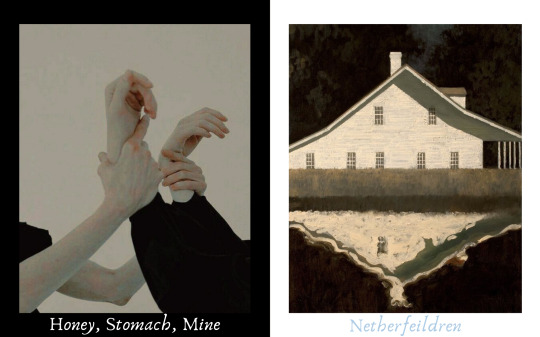
Honey, Stomach, Mine ; 1. Genus: Tragedy
Series Masterlist ; Part 2.
Pairing: Joel Miller x F!Reader
Summary: Existence is a needful thing. Choice is fickle, nature inescapable. Run to the end of the world, Joel, all those things will still find you.
She'll still come for you.
-OR-
the A/B/O outbreak AU
Rating: Explicit 18+
Content Warnings: Alpha/Beta/Omega Dynamics; Dystopian Society; Outbreak not Cordyceps AU; Light Angst; Slow Burn; Shocking Considering the Implications of Me and This Trope but Alas; Biologically Assigned Soulmates; Power Dynamics; Topping From the Bottom; Government Controlled Reproduction; Segregation of the Designations; Institutionalized Sexism; Vaguely Handmaidien Undertones; Incredibly Soft Despite the Tags; Be Not Afraid, Dear Reader!; Yearning; Emotional Hurt/Comfort; Competence Kink; Alpha Joel; Omega MC; Very Soft Joel; Older and Jaded Alpha; Young and Needy Omega; Age Gap; Size Difference; Size Kink
A/N: I've found there is an absolutely shocking lack of A/B/O in this fandom, and this is my contribution to begin rectifying that. I swear that despite the way the tags read, this is entirely and sickeningly sweet soft, comfort, caretaking fic.
Share thoughts, please. It's sort of a different one.
Word Count: 6.3K
Read on AO3
Tip Jar
Genus : Tragedy
To a one Mr. Joel Miller,
500 Sheahan Road
Clallam Bay, WA 98326
United States
We are writing to inform you that as of January 8th, 2015 there remain two weeks until your designated omega’s twenty second birthday, and a year since she has come of age. We have made several attempts to contact you with no response. As mandated by the federal government, you must collect her by January 22nd, 2015 or she will be distributed to another individual of the designation alpha who would be willing to accommodate her.
The omega’s evaluations are all up to date, and she has displayed pristine results in both health and behavioral tests. It is estimated that her first heat will occur soon, and we strongly encourage you to collect before the fever starts and our facility is forced to place her with another willing alpha that may see the process through. As she is part of the Federal Alpha/Omega Pairing Program, and is biologically paired to an alpha already, that being you, if not collected she would be placed in the bidding pool and distributed to the highest offer.
Again, we strongly encourage you to contact our facility with a response on your decision as soon as possible so that we may prepare the omega. We would like to remind you that these creatures are delicate, and unexpected changes to their habitats and surroundings cause high levels of distress. It is of the utmost importance that we proceed in accordance with the omega’s nature.
Enclosed is a brief note from your omega that she has requested to attach:
Dear sir,
I hope that you are well. I have been told that you have not decided if you will come for me, but I ask that you please do. I have been waiting, but they have told me I cannot wait anymore, and I do not know what will happen to me if you don’t come. I promise that I’ll be good if you do.
And at the bottom, in a pristine and swirly pen, and kindly, her signature, there for him to see. The name of the woman, or girl, who seems to have taken all of Joel’s choices from him. He follows the letters with the nail of his thumb, scratching at the ink as if he could make it disappear, make the reality of this poor thing out there in the world waiting for him, disappear.
At the outbreak of the designations, twelve years ago, there had been mass hysteria, mass chaos, a terrible uncertainty of how the world could continue on, segregated into biological designations as it had suddenly become. Thought to be a product of the dwindling population rates, some whispered a government experiment gone awry, a freak genetic mutation had begun to appear within the biological markers of certain people.
Designations: Alpha, Beta, Omega.
It was not that society had unfolded, lost sight of itself, it was more so that from one day to the next, a new and unknown sort of hierarchy had been established, those that were, those that were not. Those that could live their lives as they’d always done, unruled by their biological urges, and those now marked as something new and different and set by a different sort of mandates.
Joel had been one of these people.
The designations had become controlled, weaponized, systemized, almost immediately. Almost. Before the government had mobilized and taken stock and hold of the situation, there had been a momentary lapse of order. Chaos wearing the names and faces of the people he’d once known, people that should have been safe or protected, protective. The true nature of the dynamics were quickly revealed. Obvious: an unmated alpha in need of an omega was a volatile thing, quick to aggression, hungry for violence. Less so: an omega, once thought self sufficient, independent, autonomous, was found to be at times fragile, vulnerable, full of necessity. Both connected by that string of desperation that could only be soothed in a pairing of the two. The desperate drama of being no longer only yourself.
It should have been an obvious thing, the mutation, a byproduct of the dwindling population levels, reproduction rates, was in service of something that would correct this misdirection of nature. Alphas and omegas were, are, idealized pairings for one another in terms of reproduction, in terms of biological pairings. It should have been obvious that this would be wielded as a means of control. It should have been obvious that this was an untenable situation that would cast people into roles that left no choice for autonomy, for freedom.
It should have been obvious to Joel, who almost immediately, and even though he had been well into adulthood, a father to a young daughter, presented as an alpha, growing pains once again this late into his life. It should have been obvious that this was a situation that should have necessitated greater care, vigilance, protection. After all, this was the role of an alpha. He should have listened to this new nature of his that was suddenly, demandingly, presenting itself, acted quicker, stronger, with more wisdom. But he’d failed, he’d continued to fail for years to come after that terrible night when the world had turned back to its base nature in a hedonistic attempt for the preservation of humanity.
Alphas were immediately feared, ostracized, and above all else, obvious. A designation was not a thing a person could hide, especially not an alpha, the truth of their nature. Many were gunned down in the streets at the start, imprisoned, experimented on and sold, debased and tortured. They’d been caught, him and Sarah, separated from Tommy trying to escape the madness. She had, in her innocence and without designation, still only herself, still only his little girl, been caught in the crossfire of a world's desire to tame or trap something it could not understand.
Joel had, in many and the worst of ways, been caught in the crossfire too.
With time, years and the sort of suffering that can only be forced upon anything that is different or out of the norm, a system had been created. Government mandated programs, laws, registries that kept track of the designations. A hierarchy in which those that were essentially and biologically considered stronger than what a normal human should be, were ostracized, exiled, denigrated, muzzled, and those that would be considered weakest, left without any voice at all, without freedom either.
The Federal Alpha/Omega Pairing Program had been established for the continued preservation and furthering of reproductive rates. A registry was created in which all those with the designation either alpha or omega had to present themselves on, biological markers determined, all choices stripped. The program served as a match making machine, when two biological markers presented themselves as compatible, as mates of one another, an omega was assigned to an alpha for keeping. To do with as they’d see fit.
He had gotten word of her only last year. Twelve years of solitude, of nothing, of running from a girl with green eyes he’d not been able to protect and the reality of himself he detested, the what and why of who he was. He’d left Austin, wandered and hidden and groveled in the dirt like a worm until he’d finally found a quiet place to settle. A place alone, undisturbed. And for so long, he’d not been happy, surely, but he had been. Joel had been.
He looks down at the letter in his hand, dragging his thumbnail over the swoop and slope of her signature once again. This was a person who, as mandated by law or biology or fucking whatever, had been deemed as his. His other half, mate, ball and chain. The terrible reminder of what he really was and could not escape, in the form and shape of his perfect opposite.
Last year, when he’d gotten word of her existence, that she’d reached the age of twenty one and was now ready and available for his retrieving, he’d balled up the letter and thrown it with such weightless force into the fireplace in his living room that the air filled wad of paper had fallen limp and nothingful just shy of the flames, rolling in the ashes and dust, coating the reality of this imposed, undesired fate in dark soot. He’d been so angry he’d gone out and howled at the moon like the beast the world would have themselves believe he truly was.
He did not want to be an alpha. He did not want an omega. He did not want to live off the coast of Clallam Bay alone in this house he’d built with his bare hands because he had no other use of them now, no other function or purpose or meaning. He did not want it to be now, he wanted it to be twelve years ago. He wanted to still be a father.
He did not want to be an alpha.
He did not want an omega.
He crumples the letter in his fist, looking out at the bay over the edge of the cliffs from where the cabin is perched. From his spot on the deck he can see as far out as the sea allows, sight stopping suddenly as if the edge of the world had dropped off a ledge. Sometimes he longed, so, so badly, to go find that edge, to drop off it as well. He had only tried once. Never again. The grizzle of scar tissue at his temple, a testament to yet another one of his failures.
The first summons had come two weeks before her twenty-first birthday, and he’d laughed, after the anger, he’d laughed. A girl-woman of only twenty one years, deemed of age, for the role the government or God had deemed her ready for, served up on a platter to him for his own ravaging. For the correction of what nature told was an anomaly that only their coming together could solve. It was sick, disgusting. He wanted no part of it. And so, despite the knowledge that this poor thing was out there, in some government facility, places they took omegas, many orphans, but also, oftentimes separating them from their families for so called safe keeping, just another word for kidnapping. Rearing and breeding and no choices, no choices for any of them ever.
He’d ignored it, turned a blind eye and a revolted heart away from it all, and shirked the supposed responsibilities he owed this omega who he knew nothing about, who knew nothing about him. But nature is, after all, a terrible and inescapable thing. And not even so much the nature of his designation, although that did, unfailingly, play a part in his demise, surely, but the nature of his character, of Joel’s heart, that was the true heavy player. He was not the sort of man who could turn away from someone who’d rely on him, who’d need him. A responsibility. That was, he convinced himself, all he should or could see her as. And for a year there’d been a sort of tugging of a string from behind his navel, an umbilical cord connecting him to his ignored fate. He hated it all. He wanted nothing to do with any of it. He wanted to rot in his aloneness and misery and bitterness, fester in the fear that lived around him from the world. It’s why he’d come here, it’s why he’d exiled himself. Balanced on the tightrope border between the Salish Sea and the Makah Reservation on this high and pristine cliffside cut from the crust of the earth; he was left entirely alone, at peace with only his own chaotic demons to torment him. He wanted it this way, he wanted this; please, please, he’d already given away so much, lost so much of himself. Should he also be forced into this too? To sacrifice the terrible peace of his solitude to save this poor creature that was being forced on him. He wanted to say no, that he didn’t give a fuck, that what would happen to her could, it was no business of his. But those words… another willing alpha, bidding pool, highest offer… they made him see, not even red, black, black and devastating anger or rage or something horrible and base, and what could only be a product of mother nature railing against him for ignoring what he truly was. Something that whispered terrible words of mine, mine, fucking mine. A hiss he did not recognize, did not want to admit he recognized.
He was old, weathered and beaten and past his prime. Unmated. At the end of his line and unmated and purposeless, and his bones were tired, but itching and clamoring within the confines of his skin that this was wrong, that he was wrong, and that he needed to right this immediately.
That she’s waiting, and dear sir, I do not know what will become of me if you do not come. I promise that I’ll be good if you do.
And so Joel goes to her because he knows she is waiting, because fate or purpose or nature is not a thing to be ignored forever.
-
“It’s her birthday today,” the caretaker says, voice ascetic and cold and direct. Not a voice, Joel thinks, for soft things; cadence that has his teeth on edge, hackles raised. “You’ve arrived just in time. She’s been asking for you, and we’d just set her name in the pool, ready to release for auction tomorrow.” That black rage muddies the corners of his vision, and he focuses on the cold shock of the blank white hallway they’re making their way down. Hospital-like, barren and hard, this place, facility, prison, they keep them in, the omegas in the program. He feels slightly sick, uninhibitedly angry as if his teeth would fall out of his skull, as if he could throw himself to the ground as a child throws a fit, spew his anger for the world to see how much he does not want this, how vehemently he’s opposed to it all.
“She may seem young and small, but she’s twenty two now. She’s ready, and she’ll take it as you wish. It’s what she was made for.”
Joel seriously considers, just for a moment, killing the cretinous little man beside him. Take it, he says as if he has any right to speak of you taking anything that Joel would give you, as if it’s any of his business, anything he could ever understand if the beta stench oozing off of him is any indication. He hums nothing more than a grunt of acknowledgement. If he parts his teeth he’ll take out a chunk of flesh. He should behave, there are easily frightened things nearby.
White doors with a small circular window at the center line the hall on either side, endlessly down the length of the seemingly endless corridor. The caretaker, white scrubs, pristine like the rest of everything here, and Joel feels suddenly huge and bestial and brutish, marring and dirtying this place that is supposed to be of peace and quiet for the fragile things locked inside.
A terrible place that makes him desolately depressed. You’ve been here so long, and he had not come, and it’s all just one more tally of failure on his rap sheet.
When they finally stop before a singular door, the number fourteen emblazoned in large black, bold print just beneath the small viewing window, Joel suddenly feels– he can’t say for certain, he doesn’t know, or doesn't want to acknowledge the truth of the voices and sounds ringing in his ears, but he knows, recognizes it for the sound of the moment Sarah died all those years ago. His past and present suddenly clashing to meet here in this antiseptic white void, before the door to this fate that’s clamored in quiet waiting for exactly a year today. The sound of her voice, calling his name, saying it hurts, Tommy, his shouts ringing loud and then ebbing soft and as lifeless as she was while the reality of what they were living came to pass before Joel too, could realize. He’d left too, his brother, ran from the truth of Joel at the first easy opportunity. And she’s just there, her voice and her eyes and the feel of her is just there in his mind, on the tip of the tongue of his memory, and then the man opens the door and then there you are.
He feels worse now, hulking, deformed, malformed like he was born wrong. “I’ll give you a moment,” the man says low, that cold voice monotone and almost too quiet to bear now. Joel feels he needs something loud and shocking. He fears he won’t fit through the door. “It’s better if you meet for the first time without distractions. She knows you’re coming.”
He thinks he asks if you’re sleeping, he can’t be sure, but he feels the vibrations of his throat work, his jaw move as if it’d come unhinged, his tongue swollen in his mouth, gums fat and painful, full of bile and terrible memories, and he is a badly made thing in need of some goodness in this moment. And then a shift of the small lump beneath the blankets, the reality of the moment snaps into focus, he steps inside the white box cage you’re kept in. The door shuts behind him, and then it is only him, the thing he would not be, and you, the thing he would not want.
He doesn’t decide it until he finally peers into your eyes, that he can’t, will not, keep you.
Wide, luminous and wet, but not afraid, wholly curious, peering up at him from above the edge of a thick wool blanket. Something drab and gray and stiff looking that immediately sets him on edge, brings that anger back, just the simple sight of the blanket. The two of you stare at each other in silence, the weight of that thing that tells of what you are, sitting heavy between the two of you as he looks down at you from his great height, presence that should be intimidating and cowing, looming over your prone and small form on the bed. But despite his stance, something swelling within him causing him to puff up like an angry dog and want to bear his teeth at you, despite the curtain of tears in your eyes, there’s nothing of the stench of fear.
He shuts his eyes to the sight of you, huffing long and bullish through his nose, mistake, the scent of you, God, help me, and he listens to the rustle and shift of the blankets, opens his eyes to see a little nose peeking out from beneath the gray, drab thing to sniff primly at the air he’s now filling with his presence.
Soft and warm and woman, the smell of a cunt that belongs to him. That’s what it is at its basest. More complexly: vanilla, bergamot, juniper berries, sweat and fever and salt. Taking a plunge off the cliffside, bypassing the sharp teeth of rocks that would kill you, waiting for the dark ice shock of sea and finding nothing but molten life. This is what you smell like.
Worst of all, there is something in you that smells of him. His, yes, but not what he means, not his, him. Something that smells of recognition, like the two of you are the same.
Something chained inside of him rattles at the bars of its cage, desperate to be let out and quenched.
He steps back, frightened at your movement, at the reality of what the two of you are, so obvious here in this cage, at your perking up, your recognition of who and what he is, what he’s come for. You don’t speak, but you tell him. You wriggle beneath the covers, shimmying to turn and face him more fully, still clutching the blanket up high over your mouth, still covering half of your face, and he wants to bark at you to let him see, that he needs to see, but he grinds his teeth together. Molars going to dust down his throat, muscle wrapped around his mandible strung so tight he fears the fibers of it might burst and pop.
You settle on your side facing him now, and then something to beguile him, to bring him to his knees muzzled and obedient and calm, the sweetest, sultry little crooning cry. Something provoking, alluring, something to beckon him to you in surrender and acceptance and welcome, come from your chest up your throat to his ears. He jerks back at the sound, your big eyes still expectant and wet but demanding now. I am here waiting for you. I have been here waiting for you. Come now. He steps back to your bedside, a too small, too stiff metal railed cot he’s going to wrap around that fucking guard, caretaker, idiot, whatever he is when he comes back, falls to his knees, and your little fingers peek out and up and over the edge of the blanket now. And you surprise him doubly, tenfold, more than he can comprehend – but he already decided he will not keep you, he already made up his mind – when you say: “You came. You remembered me.”
He could never have forgotten.
A low hum, a sound to make your eyelids flutter and your legs shift beneath the heavily draped blankets. “Today’s your birthday, sweetheart, is it? Would you like to come home with me as your gift?”
He could never have forgotten.
-
The house that the large man who you’d waited your whole life and then a year for, brings you to – and you can’t be entirely sure, for you’ve so little experience or knowledge – but from what you can think you’re feeling now, from what you can decide, is lovely.
He had taken you in a car, a truck, you like the sound of the word, —ck, —ck, —ck, and driven a long while, through the big city which you’d seen little of, between forest and beside sea, and then finally up a long and winding road and more forest, more trees and green than you’d ever seen in your entire life, until you’d come to a cliffside, the backyard a drop off of air and rock and endless dark water, and a small house perched just there at the edge. Wooden slats, weather beaten and salt lashed, a copper sloped roof, and two pert chimneys, despite the not large area of the house, cabin. It looks, very much, as if it had grown straight from the cliff rock, sprouted by the forest, strong bones that spoke resolutely of remaining where they were no matter how hard the wind howled.
“How did it get here?” You ask the man, alpha, who’s name is Joel who has finally come for you after a life and a year of waiting.
“I made it,” and his voice is rough and demanding of attention, demanding of you, even if you don’t know, although, you do understand, what it is he’s demanding.
And you think, yes, of course. It looks a little, a lot, like him. Obvious, that it came from him.
It would be easy to think that you’re nothing but young and stupid and untried. Just a little omega kept in a cage. But you feel, after this life, not life, of being you and the thing you are, that you’re none of those things despite it all. You had lived, you had been out in the world at one time, even if briefly, even if only as a child, green and inexperienced and innocent, and although you still remain all those things, you had been out there at one point. You had never had a mother or a father, dead when you were an infant, killed in the outbreak, but you had lived with your aunt, your mother’s, many years older, sister, until you’d been ten years old. So you see, and he should see too, this man now before you, this alpha, that you were untried and inexperienced and young compared to him, but you’d had a decade of real life, even if it was the life of a child, even if afterwards it was a not life, but the before, that counted very, very much to you and so deserved respect and acknowledgement. And he should see that, although you do not know, you do understand.
After your aunt had died, and they’d taken you, first to the orphanage, and then to the place for omegas, after you’d started to mature and develop, perhaps that real life had ended. Or been put on hold, waiting for him, this alpha who seems, for all intents and purposes and from what you can gather from his sullen silence and dark looks, nothing like pleased at your presence here now. But then there was the: today’s your birthday, sweetheart, is it? And yes, yes it is your birthday.
It’s your birthday, and you’re free. And yes, you’d lived the not life in the white box for so long, and yes, you are, in fractions, so afraid and knowing so little of the world, but you do know that you want to live and to see the sky.
You want to see the sky every single day.
His big clunking truck rolls to a slow stop before the house, a wide deck wrapping around the entire boxed thing of it, and he starts to move, unclipping his belt, grabbing the bag he’d brought with him stuffed with his clothes he’d promptly tucked and folded you into when he’d shuffled you into the cabin of his truck, and you’d been all thank you, sir, to which he’d given a shake of his head, only Joel. Only Joel. No other words, no other directions, only his hands pulling your strings like a puppet. You had accepted it for the chance to feel his touch, to familiarize yourself with the closeness of him.
You want to know things. You want to know him.
He’d barely said a word the entire drive here, but you could be patient, and they’d prepared you for this, after all. They’d prepared you long and well and told you all they thought you’d need to know. So you find yourself, and not at all shockingly, as you’d waited so long for this, for him, for freedom and the sky, and look, now there’s even sea too, not even a little bit afraid, only anticipatory in bated breath, stuttering heart, excitement.
You had never seen the sea before, and you want to know things. You want to know him.
He jumps heavy and thudding form the truck, and you start to shift, something suddenly frantic and clawing rolling in your chest when you realize he’s leaving the confines of the small space the two of you had found yourselves encased in together, the warm heat from the vents blowing his smell, his smell, all around you. You’d never encountered anything like it before. Salted vetiver and warm cardamom, something sweet and musked and heavy like what your fingers taste like after you’ve pet long and needy at that soft wet place between your legs when the hurt was so tight you felt nothing would sate it. It’s a scent that you think would devastate to have taken away now that you’ve tasted it. And it’s everywhere as the two of you’d sat in his staunchly imposed silence on the truck ride to this place he was bringing you to, his home at what seems like the end of the world. It’s in your nose and down your throat, heavy and cloying and sweet on your tongue, wrapping around your waist and covering your skin and your hands so that you’d even pressed your palms entirely over your face and rubbed yourself like a cat, coating yourself in him.
The door slams, bringing you out of his scent induced reverie and back to the present, and you scramble to undo your buckle too, even though when he’d clipped it for you he’d very sternly said to not take it off, desperate to follow him wherever he’d go. But you realize quickly he’s coming around the front of the truck to your door, and then he’s there pulling it open and letting in a biting gust of wind come off the sea and up the cliffside to slash you across the face with its icy rancor. You shiver, teeth clattering and chattering in your mouth, trying to gather the blankets he’d cocooned you in, his too big, so soft clothes, more tightly around yourself, and find your feet.
He gives a rough but soothing noise, and easy as anything, plucks you up and out of the seat and into his arms, kicking the door closed behind him as he goes. Into his arms. You hold yourself stiff and wide eyed, chewing on the tips of your frozen cold fingers, and staring at him this closely, it’s shocking. Large, had been the first thing. Tall and broad and thick the way they’d said alphas are. This you had expected. The rest, you had not. The eyes, you think, more than anything. His eyes, a strange mix of hazel and brown, but dark. Eyes, that even in your greenness, you can recognize as sad and angry. And the creases at the corners, between his brows, the gray threaded through the lush, dark curls and at the corners of the hair along his jaw. He looks like he would be someone’s father. The patch of bare skin, heart shaped, amongst the whiskers. He’s beautiful, and unthinkingly, or perhaps entirely intentional, you stick out one of your saliva soaked fingers and poke him gently there, only a small prod, to feel what the heart feels like. His gait stops instantly, that permanent frown he’d worn since you’d first laid eyes on him, deepening. “Don’t do that,” he gruffs, continuing his steps up the porch now, the dark, heavy boots you’d noted as he’d taken you from the facility falling thunk, thunk on the wooden boards beneath. He’d not given you shoes of your own. And at his tone, the grumpy look, you have the inexplicable urge to laugh. To laugh at him. Surly, you want to tease, but swallow it, itchy fingertips back into the warmth of your mouth to stop yourself from touching again.
Another gust blows against the two of you as he somehow transfers you, cradled into only one arm, to pull the jingle of keys from his pocket, and you’re jarred with painful shivers, huddling closer into the unbelievably broad expanse of his chest, the unbelievably steaming warm slab. At the touch of your cheek against his collarbone you realize all he’s wearing is a simple, green flannel, no coat, nothing warm. “Aren’t you cold?” It seems suddenly, supremely important you ask, head shooting back up. He peers down his nose at you, finally getting the door open, and his eyes are a very peculiar sort of dark, you cock your head at him, a very strange sort of creature this man is, who’s come to collect you, who you’d waited all your life and a year for.
“I’m fine,” he says.
You don’t believe him.
He sets you down on a large, dark leather sofa, chocolate, the hide smooth and worn and lived in. The rest of the house, not only a house, also a home, for it’s obvious in the way of his things, the way they’re arranged and fixed and the way they too live here, not only exist here. I’ll be like that too, you think. It’s all comfortable, it’s all warm, like a den and a place to relax and be protected, juxtaposed by the sight beyond the large windows, nothing but dark, violent sea as you’ve never before seen.
He really had found a perch at the edge of the world, brought you here to perch as well.
There’s a large fireplace, inlaid with large slabs of dark stone and thick beams of wood, and yes, this too is also obvious in a peculiar and particular way. The house very much looks like it was made by the hands of a single man in some way that you cannot specifically say, but can obviously see the truth of. He made this house, and then he came for you and now he’s brought you here, and you feel, suddenly, so pleased and warm and right. Everything feels so, so right. You sigh dreamily, suffused at once with a tight, deep heat at the pit of your belly, the scent of him everywhere, bubbles floating up from the bottom of you and seeming to pop out your ears. You lean back into the deep couch, wiggling this way and that, rubbing your bottom into the soft cushions to snuggle up, bringing the neck of his sweater he’d put you in up to your nose to breathe deep and long.
He’s moving around, arranging things this way and that, a thick log in the slumbering coals, a pillow here, another blanket atop you, not looking at you, setting a wide berth once he’s settled the throw, not talking to you. It’s fine, let him do as he pleases and needs, you’ll sit here and watch. You can tell he doesn’t like to talk, that words cost him something, and you know so little, but you understand this. Words do cost something, truths, the truth of your before life and your not life. The truth of those realities cost. So, yes, you understand, and he doesn’t have to talk if he doesn’t want to yet. And looking at him, you realize that everything inside of you feels soft and bruised and little. And yet, despite all that, ready, in want and need of him. Ready to be big.
Joel.
You must say the word out loud, his name, for he stops and finally turns to face you. There is something vibrational within him. Different. You’ve never seen a creature as such. You’d never seen an alpha before, not since you’d presented, you’ve never been around one. The caretakers were all always betas, people who would not be affected by the omega’s presence and fluctuations.
He swallows once, twice, twitches and jerks and heaves a big sigh. He’s so full of energy as you, suddenly, in opposition, feel so sleepy and drowsy and ready to close your eyes and only feel warm and relaxed. You like his house, you might love it, even.
Your eyelids droop low, slow blinks, and you watch his face fold into a frown. You want to laugh, he does that so much. They’d said that alphas could have big tempers, that they could be brash and aggressive and loud, but that the omega would naturally temper that. You think it may be true because as you watch him through the weave of your lashes, his frown deepening the longer he stares at you slowly drowsing on his couch which you hope he’ll never make you move from, the jitters and the shakes and the trembling that he’d seemed, just a moment ago, to be so full of, begin to quietly abate.
He takes a step toward you, another and another until his shins meet the edge of the sofa, and you snuggle deeper into the cushions, making yourself into as little a ball as possible, so full of sleepiness.
“How do you feel?”
“I like your house so much,” you slur, head drooping, lashes drooping.
He clicks his tongue, makes that rumbly noise you think is an alpha thing because it has your eyes suddenly clicking open, sleep haze clearing momentarily so that you can look up at him again, and he’s looking at you so peculiarly. You scrunch your nose up at him, there’s no need to look at you so, you’re only an omega, only a little tired, nothing to stare at so strangely.
“I’m–” he clears his throat, makes that rumble, growl, huff sound again, “I’m glad you like it. I wanted you to be comfortable while you’re here.”
And oh, he’s so nice, you tell him, and, “I am. I’m so comfortable.” You melt further into the couch, and he crouches down to peer at you more directly, pulling a soft pillow from the opposite end and tucking it under your head, the large, rough cup of his paw cradling your skull, big fingers weaving through your hair. He arranges you so gently, like he’d take care of you. Like you’re here, finally, finally, you’re here to be taken care of.
It’s what they’d said would happen, and you’d waited so long. You’d waited too long to be let out of the white box, for him to come, to see the sky. And now there was so much; of him, of the house, of the sky, of your whole life and the sea.
You nuzzle your head into his big hand, the heat of it searing your scalp, your ear tucked into his palm. “Brave girl,” he hums. He has such a deep voice, a good voice for an alpha, you think, a very good voice. You feel it vibrating in your toes and in your eyelashes and in your belly. “You’ve been through a great deal, haven’t you?” You want to say yes, you want to remind him that you’d waited for him for so very long, and that when you woke up, if you remembered, you’d be very cross with him for taking so long to come for you.
“You rest now,” he says. “It’s all alright now.” Yes, a very good voice.
2. More Intelligent Than a Face
Netherfeildren's Masterlist
Updates Blog
#HSM fic#vic fic#joel miller smut#joel miller#joel miller x reader#joel miller fanfic#joel miller x you#the last of us AU#joel miller fanfiction#pedro pascal characters
1K notes
·
View notes
Text
For those following the Chinook Indian Nation's work toward regaining federal recognition, this is an important endorsement. I posted a while back about a petition for the state of Washington to give the now-closed Naselle Youth Camp to the Chinook. The NYC is on unceded Chinook land, and specifically the portion of land the Chinook asked to retain almost two centuries ago as part of an unfulfilled treaty with the U.S. government.
A state task force formed to determine the fate of the NYC has officially recommended the NYC be given to the Chinook Indian Nation. Not only would this put the facility into the hands of people who will make excellent use of it, but the Chinook have also stated their intention to restore the on-site wastewater treatment facility and salmon hatchery. The former would additionally be a boon to the entirety of Pacific County, which currently ships its wastewater all the way to Centralia, WA, over 100 miles away from southern portions of the county.
If the NYC is indeed given to the Chinook, this will be an important statement that can be used to pressure the U.S. government to restore their federal recognition. To find out ways you can help the Chinook in this effort, please visit ChinookJustice.org.
#Chinook#Chinook Indian Nation#Chinook people#Chinuk#indigenous rights#landback#land back#Washington#Pacific Northwest#PNW#civil rights#indigenous people#indigenous issues
399 notes
·
View notes
Text
In September 2022, the Australian High Court upheld a law that effectively allows “preventative incarceration,” or the imprisonment of people even after their sentence has been served, based on whether or not a court thinks the prisoner might be at risk of committing a future crime.
Indigenous people make up 4% of the population of Western Australia, but 40% of the state’s prisoners are Indigenous.
At Western Australia’s Banksia youth prison, 75% of incarcerated youth are Indigenous.
Australia allows for the imprisonment of children as young as 10 years old.
---
Excerpt:

Casuarina prison is a sprawling, concrete jungle on the southern outskirts of Perth, Western Australia (WA). It is a maximum-security, adult facility, home to people who may never leave its confines. However, on July 20, the penitentiary “welcomed” a new cohort of prisoners: 17 kids under the age of 18, who had been moved from the Banksia Hill Juvenile Detention Center to Casuarina [...].
When current WA Premier Mark McGowan was elected in 2017, his Labor party promised to lower the rate of Indigenous incarceration in the state, which is the highest in the nation. First Nations people are 16 times more likely to be incarcerated in WA than non-Indigenous people, a number that has only risen despite the promise of the government.
Dr. Hannah McGlade, a Noongar academic and human rights lawyer, isn’t surprised by the state’s failure to uphold its promise. “Our government cares little for Aboriginal lives,” McGlade told The Diplomat. [...]
In the past month, the Australian High Court upheld a law designed to keep the worst offenders in prison indefinitely, even after their sentences have been complete.
Known as the High Risk Serious Offenders Act (HRSOA), the legislation was challenged in Australia’s apex court when Peter Garlett, a 23-year-old Noongar man, was imprisoned after stealing AU$20 and a necklace while pretending to be armed. Despite this being his first adult offense, when his sentence was up, the Western Australian government asked the High Court to keep Garlett, now 28, in prison.
The court agreed, effectively paving the way for preventative incarceration in Australia.
Though five of the seven High Court judges upheld the constitutional validity of the HRSOA, many academics, lawyers, and activists who deal with the lives of First Nations people inside the legal system on a regular basis, note that this will only further trap Indigenous Australians in the carceral system. Garlett had been in near-continuous detention since he was 12, and this became the rationale for keeping him in prison beyond his criminal sentence.
One of the judges even hypothesized that the law could “potentially lead to the imprisonment of one seventh of the entire prison population of Western Australia for offenses that they have not committed.” [...]
“This is a crystal-clear example of an indirectly discriminatory law: one that is not discriminatory in its express terms but is discriminatory in its practical effect.” [...]
Though Indigenous people make up less than 4 percent of the state population, nearly 40 percent of Western Australia’s prison population is Indigenous. That is particularly troubling given the horrific record of Australian prisons. Since the Royal Commission into Aboriginal Deaths in Custody in 1991, over 500 First Nations people have died while imprisoned in Australia. In 2020-2021 alone, 13 prisoners died in custody in WA – five of them Aboriginal.
No custodial or police officer has ever been found criminally responsible for any of these deaths.
The structural forces pushing Indigenous people into Australia’s prisons start early. In the Banksia Hill Juvenile Detention Center, three-quarters of the inmates are Indigenous. Despite its mandate to rehabilitate people for their eventual release, reports show some of the prisoners receiving as little as five hours of education a month. In April, the state’s prison watchdog outlined a series of “cruel, inhumane, and degrading” treatments in the facility’s Intensive Support Unit. Children have reportedly made suicide pacts due to their treatment, with some being kept in isolation for 23 hours a day. [...]
Penglis and McGlade point to the age of imprisonment in Australia being only 10 years old as devastating. [...]
---
Text by: Dechlan Brennan. “How Western Australia Criminalizes Indigenous Children.” The Diplomat. 7 October 2022. [Italicized first lines/heading in this post added by me.]
2K notes
·
View notes
Text
So I started reading The Other World's Books Depend on the Bean Counter/Isekai no Sata wa Shachiku Shidai (BL isekai story)



And literally Aresh is the most pathetic poor man in this entire story. Like the stress levels Kondou gives him. They're literally unstoppable force meets immovable object
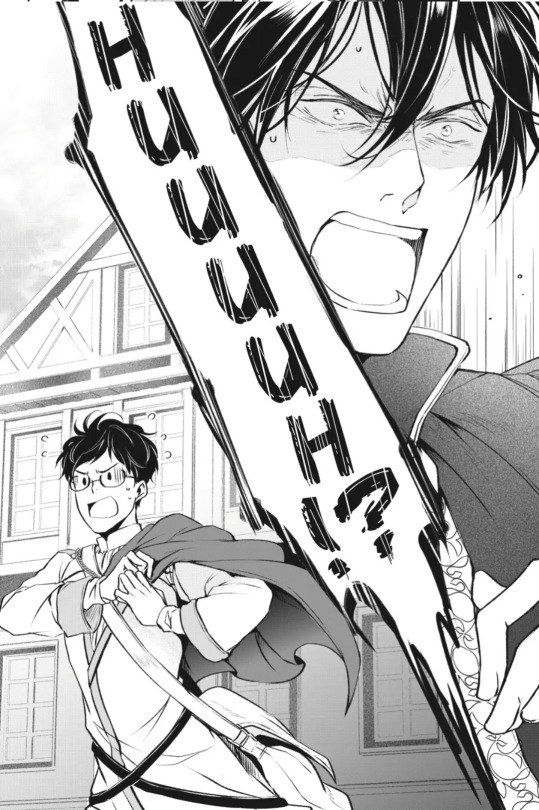
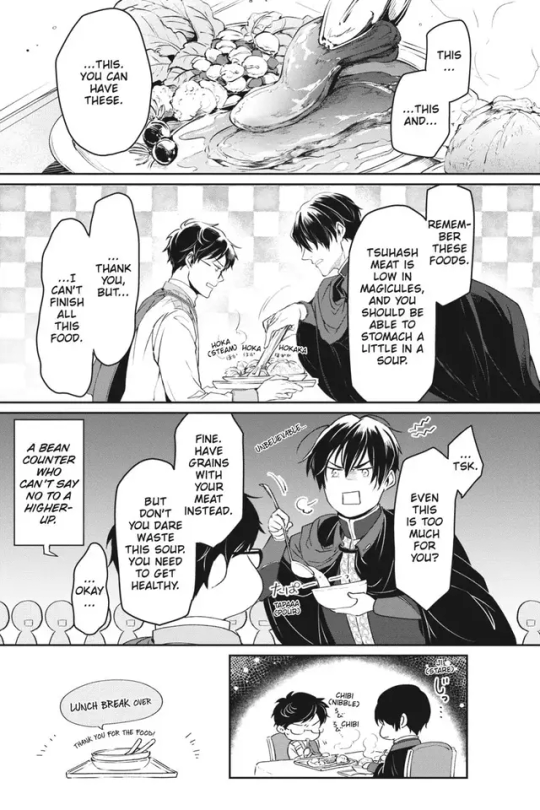
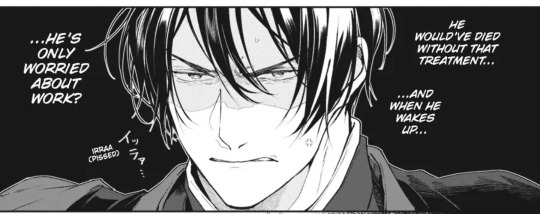
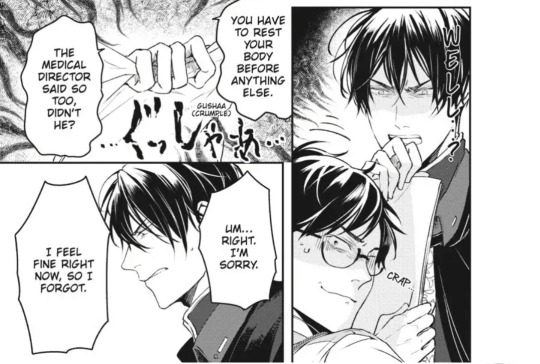
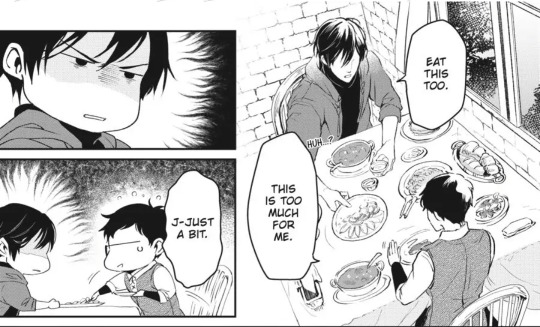
But humor aside I love how the story portrays the horrible mindset and work culture in japan and all around the world honestly. To think you have to work yourself to death to feel like you have a purpose to live is horrible and Aresh feeling straight up disturbed and disgusted with Kondou's thoughts influenced by his experiences of being a working adult in a capitalistic world was exactly how one should react.

And also it shows deep roted classism in a monarchy government with how higher ups have much more freedom and due to it most times ignore or pass on work and problems to subordinates and become unaware of the state of things due to their privileges.
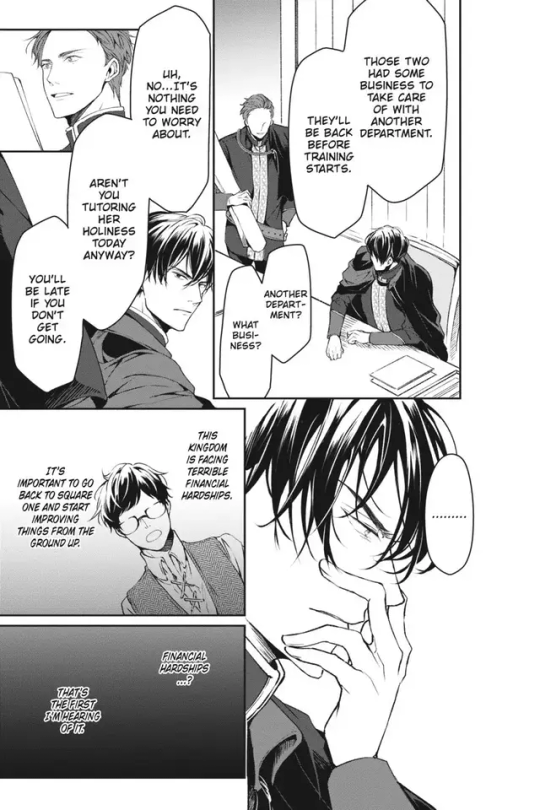
Literally this manga is so great and if possible I would love to read the novel too!
#The Other World's Books Depend on the Bean Counter#Isekai no Sata wa Shachiku Shidai#Isekai Office Worker#The Affairs of the Other World Depend on the Corporate Slave#bl manga#boys love
225 notes
·
View notes
Text


I was completely unprepared for the interior of this 1990s 5 bd. 2ba home in Jennapullin, WA, Australia. $499K. The description says it was "painstakingly crafted from the ground up by our visionary client who sought to blend the past with the present." Nah, this is a WTH House.


The realtor says, "Prepare to be captivated as you step into a world where magic and charm intertwine." So we enter. Uhhh. Okay...it's huge, but it does look like a DIY job. There are 14 stunning chandeliers, all sourced from Government House- you can see some of them in the hall.

What is up with the carpeting? It looks like he bought a bunch of area rugs on clearance. Forget the carpet in this house, it's too big for that- just roll it up. The columns are 150 year old dragon columns obtained from Foo Lok Restaurant.

It goes on to say, "the epitome of extraordinary living! If you're tired of cookie-cutter homes and crave a dash of pizzazz, sprinkled with oodles of character, then this property is your dream come true."

I'm speechless. It's gigantic and the ceiling looks like a bowling alley's. But the pressed tin formerly adorned the ceilings of houses and hotels throughout Perth. So, this is the main living area with kitchen. But, why does it look like the decor isn't secure- the ceiling looks to be peeling off. The phoenixes once graced the dining hall of the Hills Street Chinese restaurant.

Look at the proportion of that exhaust hood to the double sized stove. That's a commercial exhaust, but it's way too big. I kind of like the touch of fancy framing around the windows and the large black tiles.

Now, this could've been elegant, but it's grimy looking, not well crafted, and appears to be falling apart in places.

He tried to make an elegant bath, but everything looks so grubby. Of this, the realtor says, "Picture this: fixtures and fittings lovingly sourced from iconic buildings scattered throughout our vibrant State of WA."

So, he fashioned a double sink, but the counter is just a 2"x4" (see the knot in the wood coming thru?) with gold taps in the wall, exposed old pipe, and ornate metal grates on each side. The floor looks like remnants and the panels don't fit flush around the tub.

More pieced area rugs in the primary bedroom. There's some sort of pattern in the floor under those carpets. Maybe it was some kind of sports facility, but apparently he bought the tiles at auction.


Here's the 2nd bath. Mirror looks like it's shimmed up to be flat against the wall. Don't like any of this, with the possible exception of the floor and tub.
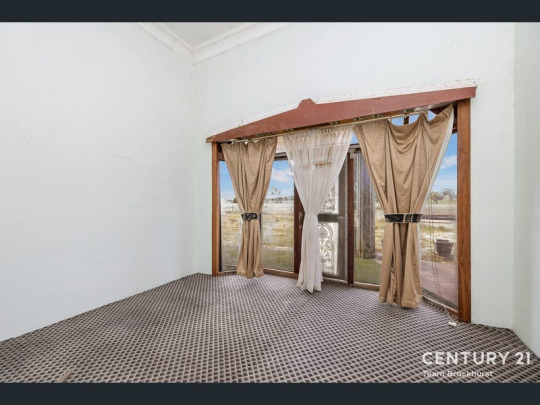
He must've gotten some deal on these rugs.
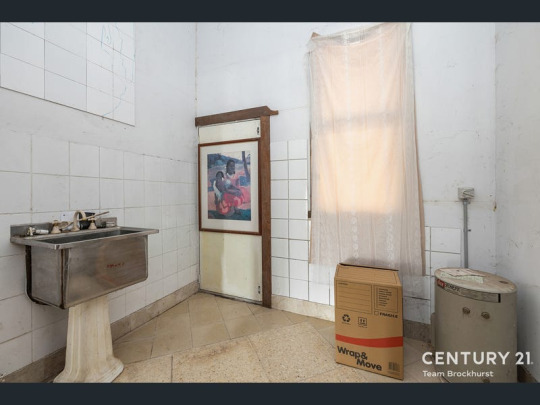
In this 1/2 bath, he fashioned an unusual sink. Clearly, he doesn't understand the concept of a pair of curtains, b/c the windows all look to be adorned with a single stretched panel.

Here's another bedroom with silk curtains that previously hung in the Melbourne Hotel, hangin' like rags. It all just looks like a real hack job, though. He bought nice stuff, but the execution sucks.
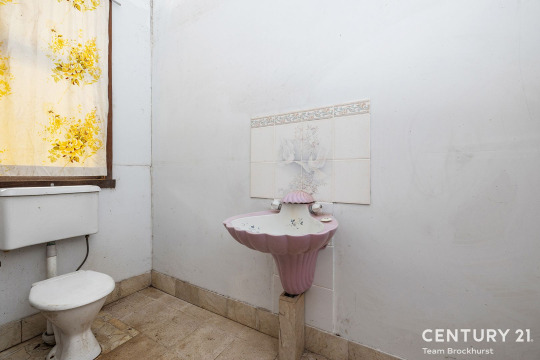
He tried, bought some cool architectural salvage, but he just wasn't able to pull it all off. Here's a cute sink, but what's going on underneath?

Even the pool looks DIY with corrugated metal.
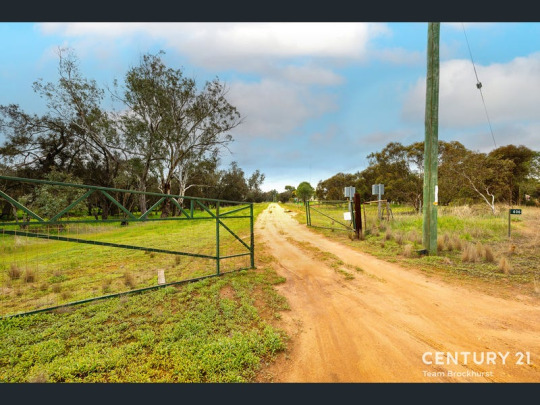

10.29 acres.



The property's pretty messy, though.
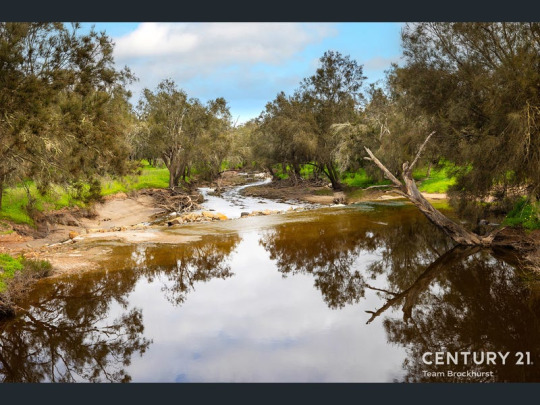
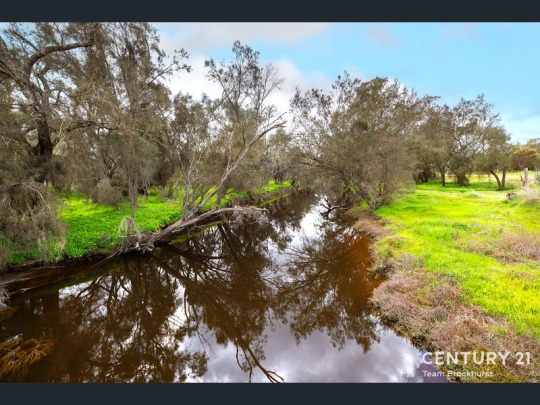
There's a creek, too. The whole thing really needs work. Maybe a new owner can make something nice out of it, but it will take a lot of money. To me it looks like a knockdown.
https://www.domain.com.au/406-frenches-road-jennapullin-wa-6401-2018641496
115 notes
·
View notes
Text
On March 2, she was gone. The Belize-flagged, British-owned bulk carrier Rubymar sank in the narrow water lane between the coasts of Yemen and Eritrea. The Rubymar was the first vessel that has been completely lost since the Houthis began their attacks on shipping in the Red Sea—and its demise, with 21,000 metric tons of ammonium phosphate sulfate fertilizer, spells ecological disaster. A similar substance—ammonium nitrate—caused the devastating explosion at the Port of Beirut in 2020. It had been stored there after being abandoned on a vessel and authorities intervened to prevent an environmental disaster.
Because the Houthis have no regard for the environment, there are likely to be more such disasters. Indeed, groups set on destruction could also decide to attack the carbon storage facilities now beginning to be built underneath the seabed.
For two weeks after being struck by a Houthi missile in the Red Sea, the Rubymar clung to life despite listing badly. The damage caused by the missile, though, was too severe. At 2:15 a.m. local time, the Rubymar disappeared into the depths of the Red Sea. The crew had already been rescued by another merchant vessel that had come to the Rubymar’s aid, but there was no way anyone could remove its toxic cargo.
The ship’s owner had tried to get it towed to the Port of Aden—where Yemen’s internationally recognized government is based—and to Djibouti and Saudi Arabia, but citing the environmental risk posed by the ammonium phosphate sulfate, all three nations refused to receive it.
Now enormous quantities of a hazardous substance are about to spread into the Red Sea. IGAD, a trade bloc comprising countries in the Nile Valley and the Horn of Africa, points out that the Rubymar’s fertilizer cargo and leaking fuel “could devastate marine life and destroy coral reefs, sea life and jeopardize hundreds of thousands of jobs in the fishing industry as well as cut littoral states off from supplies of food and fuel.”
Not even shipping’s option of last resort, salvage companies, seems available. “The salvage companies that normally recover vessels are reluctant to go in,” said Cormac Mc Garry, a maritime expert with intelligence firm Control Risks. That’s because salvage ships and crews, too, risk being targeted by Houthi missiles. “If a salvage company knows it’s likely to be targeted, it will hesitate to take on the task. It has a duty of care for its crew,” said Svein Ringbakken, the managing director of the Norway-based maritime insurance company DNK.
It was only a matter of time before a Houthi missile brought down one of the many tankers and bulk carriers that still traverse the Red Sea every day. (In the first two months of this year, traffic through the Red Sea was down by 50 percent compared to the same period last year.) “The Houthis have no regard for life and even less for the environment,” Ringbakken said. “They shoot missiles at ships even though they know that there are humans and hazardous cargo on them.”
For years, the Houthis allowed an oil supertanker ironically named Safer that was moored off the coast of Yemen to rust away even though she was holding more than 1 million barrels of crude oil. By the beginning of last year, the Safer was close to disintegration: an event that would have cost hundreds of thousands of Yemenis their livelihoods because it would have killed enormous quantities of fish. Indeed, had the Safer’s oil leaked, it would even have forced the Houthi-controlled ports of Hudaydah and Saleef to close, thus preventing ordinary Yemenis from receiving food and other necessities.
It would, of course, also have caused permanent damage to all manner of marine life, including coral reefs and mangroves, in the Red Sea. Then the United Nations pulled off an almost impossible feat: It got Yemen’s warring factions, international agencies, and companies to work together to transfer the oil off the Safer. Disaster was averted. “It was a massive undertaking,” Ringbakken noted. “But for years and years and years, the Houthis were adding impediments against this undertaking, even though the Safer was sitting just off the Yemeni coast.”
Indeed, maritime terrorism itself is not new. “Besides guerrillas and terrorists, attacks have been carried out by modern day pirates, ordinary criminals, fanatic environmentalists, mutinous crews, hostile workers, and foreign agents. The spectrum of actions is equally broad: ships hijacked, destroyed by mines and bombs, attacks with bazookas, sunk under mysterious circumstances; cargos removed; crews taken hostage; extortion plots against ocean liners and offshore platforms; raids on port facilities; attempts to board oil rigs; sabotage at shipyards and terminal facilities; even a plot to steal a nuclear submarine,” researchers at RAND summarized—in 1983.
Now, though, the Houthis have upped the nihilism, and unlike the guerrillas, terrorists, and pirates of the 1980s, they have the weaponry to cause an ocean-going vessel to sink. The joint U.S.-U.K. military operation against the Houthis has failed to deter the Iranian-backed militia’s attacks; indeed, not even air strikes by U.S. and U.K. forces have convinced the Houthis that it’s time to stop. On the contrary, they’re escalating their attacks. They do so because they’re completely unconcerned about loss of life within their ranks or harm to their own waters.
It’s giving them a global platform. That, in turn, is likely to encourage other militias to also attack ships carrying toxic substances—even if it ruins their own waters. The local population is hardly in a position to hold a militia accountable. Indeed, militias interested in maritime terrorism could decide that the world’s growing sea-based infrastructure is an attractive target. And there’s a new form of sea-based infrastructure they could decide to make a preferred target, not just because it’s set for explosive growth but because attacking it would guarantee a global platform: CO2 storage.
With the world having failed to reduce its carbon-dioxide emissions enough to halt climate change, CO2 storage has become an urgent priority. Through this technique, carbon dioxide can be captured and buried underground, typically underneath the ocean. Norway has, for example, begun auctioning out licenses for CO2 storage exploration on its continental shelf. So has Britain. The United States has 15 carbon-storage sites, and another 121 are being developed. Even Big Oil has discovered carbon storage. ExxonMobil is buying offshore blocks to use for carbon storage instead of oil drilling.
Carbon storage sites are, of course, designed to withstand both natural perils and man-made attacks, but that won’t prevent destructive groups—especially ones backed by a powerful state—from trying. And because groups like the Houthis are so unconcerned about all forms of life, it won’t matter to them that releasing concentrated CO2 would cause extreme harm to the planet—including themselves. Even a tiny carbon-storage leakage of 0.1 percent per year can lead to additional CO2 emissions of 25 giga-tonnes, researchers have established.
Until recently, sea-based infrastructure was only lightly guarded, because it was in everyone’s interest that it worked. The sabotage of Nord Stream and various other pipelines and undersea cables over the past two years have demonstrated that such peacefulness can no longer be taken for granted. The new CO2 sites will need not just AI-enhanced monitoring but regular patrolling to communicate to potential attackers that it’s not even worth attempting an attack.
And for now, attacking merchant vessels remains a promising and economical strategy for the Houthis and their ilk. It doesn’t seem to matter that ammonium phosphate sulfate will soon be poisoning Yemeni waters and thus depriving locals of their livelihoods. Indeed, other bulk carriers and tankers may soon join the Rubymar on the bottom of the sea, poisoning the future for even more Yemenis.
For the Houthis, what matters is not the outcome: It’s the attention. That’s what makes them such a vexing problem for the U.S. Navy and other navies, shipowners, maritime insurers, and especially for seafarers. But there is another group that should be just as worried about the rampant insecurity on the high seas: ocean conservationists.
There is, in fact, a woman with an unsurpassed green platform who could make the growing scourge of maritime terrorism her new cause. (Nearly) everyone would thank you, Greta.
33 notes
·
View notes
Text
Decolonization is, put bluntly, the rematriation of land, the regeneration of relations, and the forwarding of Indigenous and Black and queer futures—a process that requires countering what power seems to be up to. To take effective decolonizing action, we must then have a theory of action that accounts for the permeability of apparatuses of power and the fact that neocolonial systems inadvertently support decolonizing agendas. […] Colonial schools have a tradition of harboring spaces of anticolonial resistance. These contradictions are exquisitely written about by the eminent novelist, literary scholar, and postcolonial thinker Ngũgĩ wa Thiong’o. He describes how the machine of British colonial schooling in Kenya produced a Black governor of colonial Kenya and, paradoxically, also helped to produce Mau Mau revolutionaries. Fearful that schools sheltered the Mau Mau, who occupied the imaginations of Indigenous Kenyans and settlers alike as he quintessential Black, violent resistance movement, the colonial state banned many of its missionary-inspired schools in the 1952 declaration of a state of emergency. This ban included the Kenya Teachers College, whose campus was converted into ‘a prison camp where proponents of resistance to colonialism were hanged.’ During the Mau Mau Rebellion, [Ngũgĩ] attended Alliance High School, a segregated, elite missionary school for Black Africans in British Kenya. And prior to that, he attended Manguo elementary school, which was banned for a time by the colonial government. How can colonial schools become disloyal to colonialism? According to [Ngũgĩ], the decolonial is always already amid the colonial.
la paperson, A Third University Is Possible (Duke University Press, 2017), pp. xv–xvi, summarising Ngũgĩ wa Thiong’o’s Dreams in a Time of War: A Childhood Memoir.
20 notes
·
View notes
Text
Jonathan Bailey's interview with The Standard (2023)
(TW: this interview contains a story of Jonny being threatened by an homophobe in DC the day after the Human Campain Rights Gala)

Queer as Folk, Will & Grace, It’s a Sin: it’s not as if TV hasn’t tackled the gay male experience – and well – before. But I can’t think of a gay, straight (as it were) drama that matches the sweep and sheer mainstream gloss of Ron Nyswaner’s new eight-part Paramount+ series Fellow Travelers.
Nor can I think of one that does sex quite as brilliantly – frequent, searingly hot, sometimes tender, sometimes perfunctory, sometimes borderline brutal (one of the writers’ rules, Nyswaner has said, was “that we would never repeat the same act. When we got to episode eight, we were really kind of flummoxed”) and always articulate in a way that the necessarily secretive characters can’t be.
It’s certainly the first series I’ve seen that explores gay relationships in such an unapologetic yet nuanced and, frankly, expensive way, I tell Bailey, when I meet him at the Corinthia hotel in London.
“Totally,” he says. “And you can see it on the screen; the respect. In the early 90s, you needed a straight superstar like Tom Hanks [in Philadelphia, also written by Nyswaner] to bring a queer story and commission it. Cut to thirty years later, and it's the story itself that is the commissionable thing.”
I think the heartthrob star of Bridgerton is underselling his own clout a bit. The series follows the love affair between Tim Laughlin, an idealistic young congressional staffer (Bailey), and the vastly more experienced, cynical and outrageously handsome State Department official Hawkins ‘Hawk’ Fuller (Matt Bomer, whose all-American jawline could open a can of luncheon meat) that begins at the height of McCarthyism.
It jumps around a thirty-year timeline, expanded beyond the mid-century scope of Thomas Mallon’s original novel, to explore the relationship’s far-reaching repercussions, and the way that legislated oppression shapes people.
The other thing that stands out about the series, which begins in 1953 at the start of the Lavender Scare – the government crackdown on homosexual federal employees that resulted in upwards of 5,000 losing their jobs, and an alarming number taking their own lives – is that all the gay leads are played by out gay actors.
Bailey has said before that the important thing is gay stories being told, rather than slavishly ‘appropriate’ casting, and “I still 100 per cent stand by the fact that I think all actors should be able to do everything,” he says. “But to have gay actors chronicling the oppression and the trauma of it, I think it only adds to the experience. It's exciting that people welcome it.”
It’s encouraging too, that an out gay man was trusted to anchor a heteromantic behemoth like Bridgerton, to the point that having been snapped at Wimbledon with Ariana Grande (with whom he stars next year in the movie of Wicked), a newspaper was calling his agent threatening to out him as straight (“I'm in two minds about whether that's a really good sign of progression”). But all this progress is set against a sobering backdrop.
Rights for women and LGBTQ+ people are being rolled back across the world. Hate crimes based on sexuality have risen by 112 per cent in the last five years in England and Wales alone. How does he feel, right now, I ask him. After a moment’s consideration, he tells me a story that shocks me to my core.
He’d been to Washington DC, he tells me, at an annual event for the LGBTQ+ organisation The Human Rights Campaign.
“It was an incredible experience,” he says, sitting one leg tucked under on a tasteful beige chaise longue. “I met President Biden. I was there with Shonda Rhimes, she was being given an award, Matt Bomer was given another one; I was introducing him. My first political gala. I had the most amazing night; had a drink; couldn't sleep; buzzing.
“I woke up the next morning, it was like a montage. Sunshine, I was like, this is brilliant. I went into a coffee shop, and I was wearing a Human Rights Campaign cap from the night before. And the young lady who I was ordering from recognised me from Bridgerton, we were just chatting.
“And a man arrived behind me and he said, ‘Are you famous?’ And I said something like, 'I'm really famous for ordering coffee,' which is actually quite an annoying thing to say,” he laughs. “And then he got my cap, and he pulled it off my head and he threw it across the room and he said, ‘get out of this f***ing coffee shop, you queer.”
The room went still, Bailey remembers. But he walked over, picked up his hat, and put it back on his head. “If you don't take that cap off, I'm gonna f***ing shoot you,” it came again. “Where I'm from, people like me kill people like you.”
It was, of course, terrifying. But “in the moment, everything slows down,” he says. “No one knew what to do, apart from one girl, she was amazing. Angela, she came up, and she got her phone out and she said, ‘I'm recording this message, I think you are welcome in this country. And what you're saying, I think, is appalling.’ That happened sort of five minutes in, and he left.”
The man was from Pennsylvania (yes, Bailey did ask), and what Bailey took from the experience, he says, is that “potentially, there is a kid who – that's his father. That's his uncle. That's his teacher.”
He pauses. “My life was threatened. My body believed it; my brain didn't and it took me a while to really catch up with it. But I've got friends and security. There are so many people that don't. They are surrounded by that every day, and the torment of what that must be like, the amount of fear that was generated... If that's what children are surrounded by, they're not going to be able to grow in any way.
“And of course, that's not just an American story,” he continues. “It's international. And it's terrifying, that [here in the UK] we're not looking after queer people, in terms of allowing them into the country. Because that is the reality; people’s lives are literally at risk.”
He says the messages he’s been getting in response to the show bear this out. “People are still living in the closet. Or they’ve had a moment where they're watching and they realise, that was their father's story, or their mother's story; or it’s people who have been affected by this, but for the first time are understanding the trauma.
“People are so shocked that this is such recent history, but the majority of people in the world are living under that sort of belief system. And people on Instagram message from areas in the world where just getting through the day without being outed is survival.”
Bailey, 35, grew up in rural Oxfordshire as the youngest of four and the only boy to an audiologist mother and a father who worked for Rowse Honey. He had nothing but support and love within his family, but even he internalised shame from the way gay people were represented in the media when he was growing up.
“The majority of gay people were either the butt of jokes, or being caught in sexual acts and considered deviants, or they were committing suicide, or they're dying of AIDS,” he says.
He’s spoken before about an episode of Casualty he saw, aged 11, with exactly the latter storyline, “and I do remember that episode, viscerally, and crying and being like, that's what I'm [going to be]. And that isn't Casualty’s fault. It's brilliant to have that story out there. But it was the lack of variety, of access to being allowed to feel that you're going to be okay.”
Having said that, he says, “every five years is a different gay generation. It was nowhere near as tough as if I'd have been born 15 years earlier. Me and my friends, two in four, if not three in four, would not be here.”
His relationship status is off-limits. There’s “a lovely man”, but that’s all he’ll say. “It's not secret, but it's private,” he says. “Having a private life is, for me, completely critical. I don't know if I would be able to be as confident to speak out on other things if I felt that my whole life was up for grabs.”
Bailey’s next big screen project is Wicked, playing Fiyero alongside Grande as Glinda and Cynthia Erivo as Elphaba. At one point though, he was doing that, Fellow Travelers and Bridgerton at the same time, which sounds insane.
“On World AIDS Day last year, I was in Canada playing Tim on the AIDS ward,” he says (you know this from the start, no spoilers here). “And then I wrapped, went straight to the airport, slept on the plane, got up and went straight to a Regency ball, slept in a hotel in London overnight and then went and danced with Ariana Grande for a day, my first day of rehearsal. Then I came back and burnt some conscription papers for the Vietnam War on the Monday.”
He’s got big plans of his own too – galvanised by the gala in Washington, he’s been working with the charity Just Like Us, which brings queer speakers into schools. "You're twice as likely to be bullied if you're gay, or queer," he says. "And yet if there's positive LGBTQ+ messaging within the school system, 100 per cent of people's mental health and happiness increases. It's a no brainer." He is planning to establish a foundation next year, to consolidate his charitable work.
But for now he’s glad to be home for a bit. Bailey moved out of London to be closer to his Nana during lockdown, and stayed (“I was watching Strictly with her the other day”). She’s 93, born in 1930, so “we worked out she's the same age as Tim. So we charted everything that Tim experiences with where she was, and it was amazing,” he says.
“I knew that she had known one gay man at work in her life, because that obviously came up when I was having conversations about who I am, and I knew he had taken his own life. She's watching Fellow Travelers, and it's really emotional for her because she's, I think for the first time, really being allowed to understand what might have been going on.”
She's “blown away” by the show, he says. They haven’t talked about “specific scenes”, but “she said to my sister – ‘I didn't know he had it in him.’ I actually want that on a T-shirt.”
Source
#fellow travelers#jonathan bailey#jonny bailey#lgbtq+#lgbtqia#interviews#interviews:2023#the standard 2023#NEW!
49 notes
·
View notes
Text
alright. let’s talk about the Australian constitution. caveat that I’m not a lawyer, I’m a political scientist, so all this is from a political science perspective and I may be wrong about the LEGAL parts
which of the following do you think is in the constitution:
the concept of the opposition leader
the concept of the cabinet
the concept of the prime minister
any individual rights and freedoms at all
the ACT and NT
New Zealand
for those playing along at home, the answer is number six! there was a point of time when Australia was trying to negotiate with NZ in such a way that they would be recognised as an Australian state, and that was just… never removed. that doesn’t mean they ARE one of our states — they never signed the constitution so it doesn’t really apply
the point is… the Australian constitution is hella bare bones. it’s sparse. we don’t have rights or freedoms and we’re not forced to have a prime minister. similar to under the UK system, Australia is mostly ruled by convention rather than constitution
what people fail to understand about the Australian constitution is that it was written primarily to organise separation of powers, with respects to:
state powers vs federal powers, and
within the federal government, legislature vs executive vs judiciary, and
Australian vs British governments
most of the other shit in there was put into the constitution in order to encourage various actors to sign onto it. famously, the race powers comes under this category. WA and Queensland had particular ideas about first nations people, and they wanted that protected. there are a couple other examples of this, but not many
fundamentally, my fellow Australians need to recognise that our constitution is about defining Australian institutions and powers. it’s not about individuals. it’s not about freedom. it’s not about rights. it’s about who gets to legislate on trade and who gets to legislate on public holidays. you cannot defer to the constitution if you want to argue about your rights, because you just won’t find them there <3
36 notes
·
View notes
Note
I’m starting to get worried that because I’m criticizing the Israeli government, it could lead to me turning antisemitic or something unknowingly. How can I talk about the horrors that Palestinians are going through because of the Israeli government without spiraling into bigot territory?
The first time I ever learned about Historic Palestine was during my second year of University when I took an intersectionality class. For transparency, I was ignorant about many global issues when I was 17/18 years old, because living in a white-settler state (Canada) -with a formal education system that didn't cover topics or histories that didn't align with their 'diplomatic narratives about western countries and their perspectives,' I was, unfortunately, (although, not to excuse, it's something I still feel shame for -I wish I had known better) ignorant about many histories/herstories/and their-stories.
That was over 12 years ago, and I have many regrets about not knowing what I eventually learned -but that's the unlearning, learning and growth process -the starting point and the ongoing research ventures and accountability for oneself to understand what is going on in the world is what's important.
The reason why I'm starting off with this story is because I met a Palestinian activist during that class. She was featured on a panel alongside a few other activists, including a Sudanese women, and each of them spoke about their resistances to settler-colonizers, imperial powers, and systemic violence. And I will never forget what the Palestinian activist said during a Q&A session -that she would be willing to die to see Palestine free in her lifetime.
I think it's important to note that 'Israel,' has only existed since 1948. Indigenous Palestinian people were forcibly displaced (750,000 of them) -and tens of thousands were killed and 400 villages were destroyed (this is referred to as the Nakba of 1948). So, in essence, 'Israel' is full of settler-colonizers -they have been illegally occupying Palestine for decades and have been slowly, but surely, stealing land, terrorizing and murdering Palestinian people and have control on essentially every single aspect of a Palestinian person's life -right down to their access to water, electricity consumption, and travel -to name a few.
You are not antisemitic by criticizing a settler state that has been and continues to systematically ethnically cleanse Indigenous Palestinian people. You are not antisemitic by calling out settler-violence, carpet bombing, and the rampant and merciless destruction of an entire city's infrastructure. You are no antisemitic for saying it's immoral that the IOF is attacking hospitals, places of worship, schools, and refugee camps because it has killed thousands of Palestinian people -most of whom are defenseless children. You are not antisemitic for saying that it is a double standard for 'Israel,' to claim what they have been and are doing isn't a form of terrorism (despite breaking international laws and dozens of UN resolutions).
I am not an expert, but I do want to state (as some activists and writers here have) that conflating Pro-Palestinian liberation with antisemitism is something Zionists in the IOF and around the world have carefully crafted so that it deflects from the real issues here and that is the mass human rights violations, crimes against humanity, and illegal occupation that the IOF has done for decades in the first place.
Judaism and Zionism are DIFFERENT -being Jewish and following the Torah is not like what Zionists in the IOF want; which is literally to burn Gaza to the ground by either genociding Palestinian people and/or mass displacing them. There are MANY anti-Zionist Jewish people and anti-Zionist Israeli Jewish people who are against what the IOF is doing, and I think that is important to note here. Because you're not going to spiral into bigotry when you know that being in solidarity with Palestine means you are supporting people who want to be free from a violent occupation.
There are a few posts I have seen, one of them being "10 Talking Points," or to some effect when talking to Zionists who insist you're being antisemitic, or 'oppressive against Jewish people,' that I would highly recommend reading. I do not have it to link here, but I am hoping it is searchable.
Let's Talk Palestine on Instagram also has some wonderful educational resources, one of which covers how to have important conversations with people around you, but highlighting the terrors (as you noted) that Palestinian people go through. You can find them there, and in the next 24 hours, I will try my best to post and transcribe some of these resources.
This is by no means encompassing, but I hope this offered some clarity. Thank you for your question!
#feminist#feminism#social justice#palestine#freepalastine🇵🇸#free palestine#free gaza#intersectional activism#intersectionality#from the river to the sea palestine will be free#israeli settlers#anti zionisim#palestinian history#settler colonialism#settler violence
35 notes
·
View notes
Text
MHA Chapter 374 spoilers translations
This week’s initial tentative super rough/literal translations under the cut.
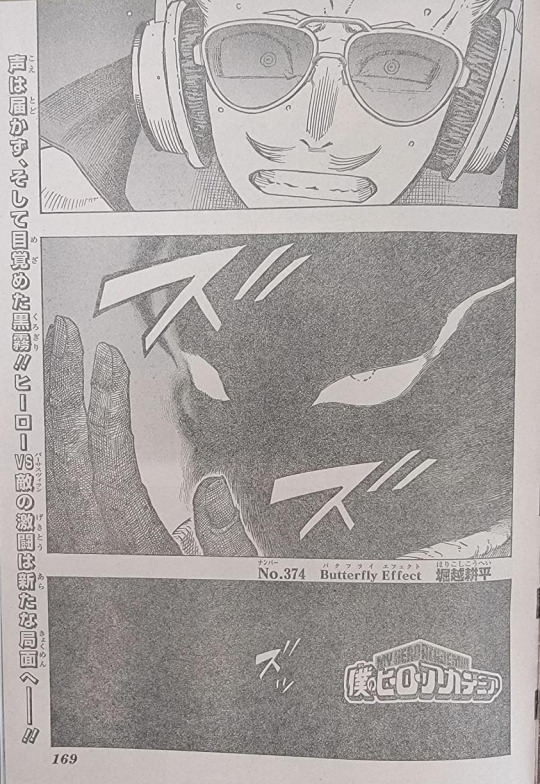
tagline 1
No.374 Butterfly Effect 堀越耕平
ナンバー374 バタフライ エフェクト ほりこしこうへい
NANBAA 374 BATAFURAI EFEKUTO Horikoshi Kouhei
No. 374 Butterfly Effect Kouhei Horikoshi
tagline 2
声は届かず、そして目覚めた黒霧‼︎ヒーローVS敵の激闘は新たな局面へーー‼︎
こえはとどかず、そしてめざめたくろぎり‼︎ヒーローバーサスヴィランのげきとうはあらたなきょくめんへーー‼︎
koe wa todokazu, soshite mezameta Kurogiri!! HIIROO BAASASU VIRAN no gekitou wa aratana kyokumen e---!!
His voice didn’t reach, and then the awakened Kurogiri!! The fierce battle of Heroes VS Villains enters a new phase---!!
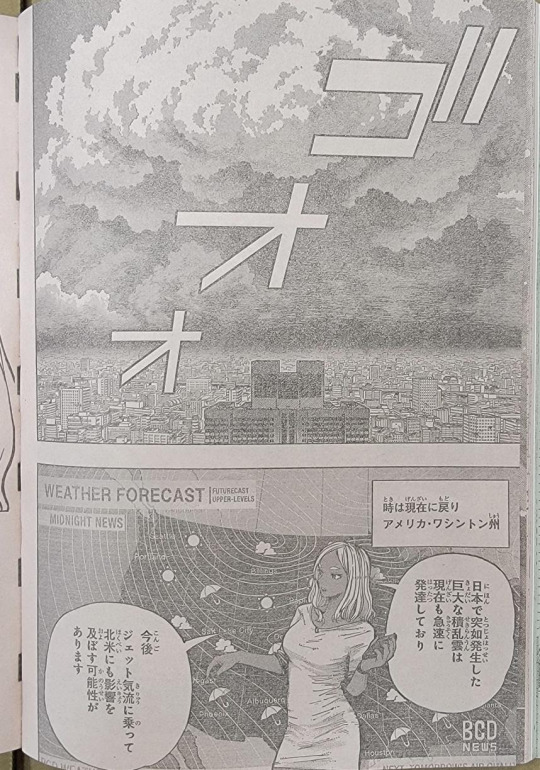
1
時は現在に戻りアメリカ・ワシントン州
ときはげんざいにもどりアメリカ・ワシントンしゅう
toki wa genzai ni modori AMERIKA WASHINTON shuu
Time returns to the present, USA - Washington State
2
日本で突如発生した巨大な積乱雲は現在も急速に発達しており
にほんでとつじょはっせいしたきょだいなせきらんうんはげんざいもきゅうそくにはったつしており
nihon de totsujo hassei shita kyodai na sekiran’un wa genzai mo kyuusoku ni hattatsu shite ori
“A giant cumulonimbus cloud that suddenly appeared in Japan is still rapidly developing.”
3
今後ジェット気流に乗って北米にも影響を及ぼす可能性があります
こんごジェットきりゅうにのってほくべいにもえいきょうをおよぼすかのうせいがあります
kongo JETTO kiryuu ni notte hokubei ni mo eikyou wo oyobosu kanousei ga arimasu
“From here on, there is a chance it could ride a jet stream and affect North America as well.”
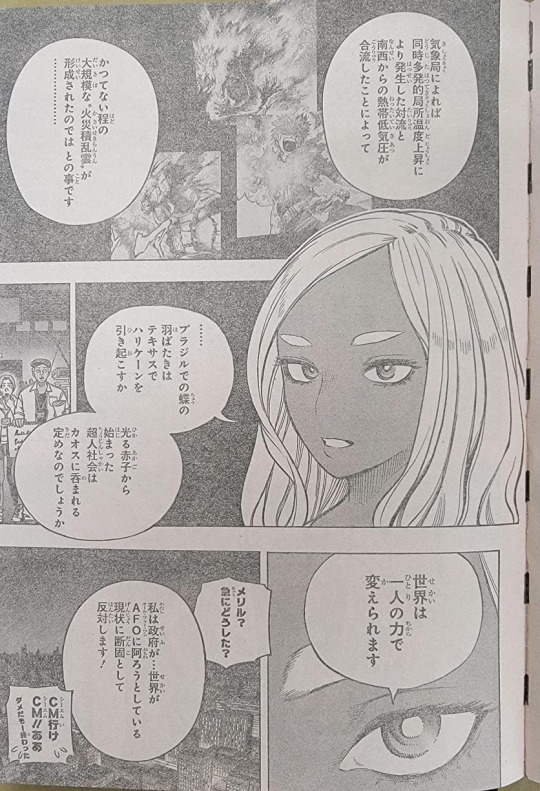
1
気象局によれば同時多発的局所温度上昇により発生した対流と南西からの熱帯低気圧が合流したことによって
きしょうきょくによればどうじたはつてききょくしょおんどじょうしょうによりはっせいしたたいりゅうとなんせいからのねったいていきあつがごうりゅうしたことによって
kishoukyoku ni yoreba douji tahatsuteki kyokusho ondo joushou ni yori hassei shita tairyuu to nansei kara no nettai teikiatsu ga gouryuu shita koto ni yotte
“According to the weather bureau, due to the convergence of convection generated by multiple simultaneous local temperature rises with the tropical cyclone from the southwest,”
2
かつてない程の大規模な"火災積乱雲"が形成されたのではとの事です………………
かつてないほどのだいきぼな"かさいせきらんうん"がけいせいされたのではとのことです………………
katsute nai hodo no daikibo na “kasai sekiran’un” ga keisei sareta node wa to no koto desu..................
“it is said an unprecedented large-scale ‘pyrocumulonimbus cloud’ was formed..................”
3
……ブラジルでの蝶の羽ばたきはテキサスでハリケーンを引き起こすか
……ブラジルでのちょうのはばたきはテキサスでハリケーンをひきおこすか
......BURAJIRU de no chou no habataki wa TEKISASU de HARIKEEN wo hikiokosu ka
“......Will a flapping butterfly in Brazil cause a hurricane in Texas?”
4
光る赤子から始まった超人社会はカオスに呑まれる定めなのでしょうか
ひかるあかごからはじまったちょうじんしゃかいはカオスにのまれるさだめなのでしょうか
hikaru akago kara hajimatta choujin shakai wa KAOSU ni nomareru sadame na no deshou ka
“Is the superhuman society that began with a shining baby destined to be swallowed in chaos?”
5
世界は一人の力で変えられます
せかいはひとりのちからでかえられます
sekai wa hitori no chikara de kaeraremasu
“The world can be changed by the power of one person.”
6
メリル?急にどうした?
メリル?きゅうにどうした?
MERIRU? kyuu ni dou shita?
“Meryl? What happened all of a sudden?”
7
私は政府が…世界がAFOに阿ろうとしている現状に断固として反対します!
わたしはせいふが…せかいがオール・フォー・ワンにおもねろうとしているげんじょうにだんことしてはんたいします!
watashi wa seifu ga...sekai ga OORU FOO WAN ni omonerou to shite iru genjou ni danko to shite hantai shimasu!
“I strongly disagree with the status quo where our government...where the world is trying to pander to All For One!”
8
CM行けCM‼︎ああ
シーエムいけシーエム‼︎ああ
SHII EMU ike SHII EMU!! aa
“CM, go to CM!! Aah”
(Note: I assume “CM” means “commercial.”)
small text
ダメだもー終わった
ダメだもーおわった
DAME da moo owatta
“No good, it’s already over.”

1
日本 神野区 (轟、荼毘確保)
にほん カミノく (とどろき、だびかくほ)
nihon KAMINO-ku (Todoroki, Dabi kakuho)
Japan, Kamino Ward (Todoroki and the secured Dabi)
2
なんだこの火力は‼︎
なんだこのかりょくは‼︎
nan da kono karyoku wa!!
“What’s with this fire power!!”
3
轟くん 君も灼ける今再戦は無理だ!"燐"で限界の筈だ!
とどろきくん きみもやけるいまさいせんはむりだ!"りん"でげんかいのはずだ!
Todoroki-kun kimi mo yakeru ima saisen wa muri da! “rin” de genkai no hazu da!
“Todoroki-kun, now that you’ll burn too, a rematch is impossible! This is surely the limit of Phosphor!”
4
全員限界だよ!皆限界を超えて頑張ってる!
ぜんいんげんかいだよ!みんなげんかいをこえてがんばってる!
zen’in genkai da yo! minna genkai wo koete ganbatteru!
“This is the limit for all of us! Everyone is surpassing their limits and trying their best!”
5
でも…あいつだけが!
demo...aitsu dake ga!
“But...only this guy!”
6
まだ…
mada...
“He’s still...”
7
動いてるんだ!
うごいてるんだ!
ugoiterunda!
“moving!”
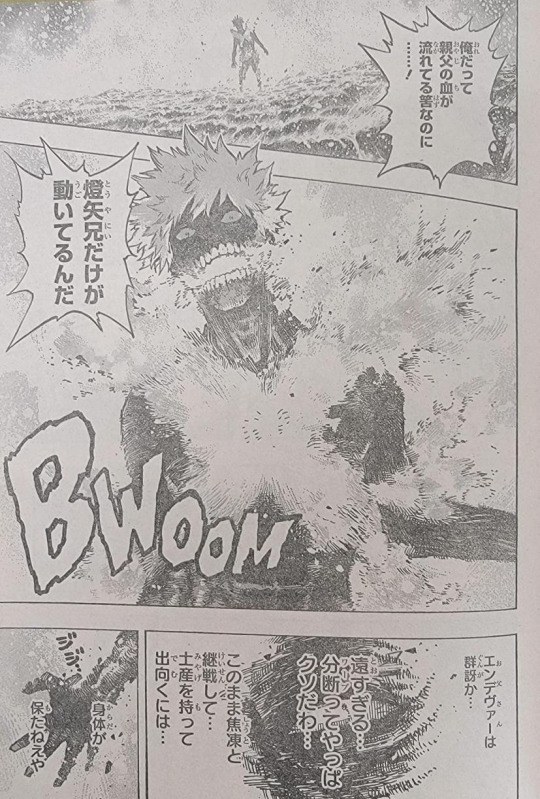
1
俺だって親父の血が流れてる筈なのに……!
おれだっておやじのちがながれてるはずなのに……!
ore datte oyaji no chi ga nagareteru hazu na no ni......!
“Even though I, too, have father’s blood flowing through me......!”
2
燈矢兄だけが動いてるんだ
とうやにいだけがうごいてるんだ
Touya-nii dake ga ugoiterunda
“Only Touya-nii is moving.”
(Note: “Nii” is a suffix meaning “older brother.”)
3
エンデヴァーは群訝か…
お父さんはぐんがか…
otousan (kanji: ENDEVAA) wa gunga ka...
Father (read as: Endeavor) is at Gunga, huh...
4
遠すぎる…分断ってやっぱクソだわ…
とおすぎる…ワープってやっぱクソだわ…
too sugiru...WAAPU (kanji: bundan) tte yappa KUSO da wa...
Too far away...the warp (read as: division) really was shitty...
5
このまま焦凍と継戦して…土産を持って出向くには…
このまましょうととけいせんして…みやげをもってでむくには…
kono mama Shouto to keisen shite...miyage wo motte demuku ni wa...
To continue fighting with Shouto as things are...I’ll be coming back with souvenirs...
6
身体が
からだが
karada ga
[My] body
7
保たねえや
もたねえや
motanee ya
won’t last.
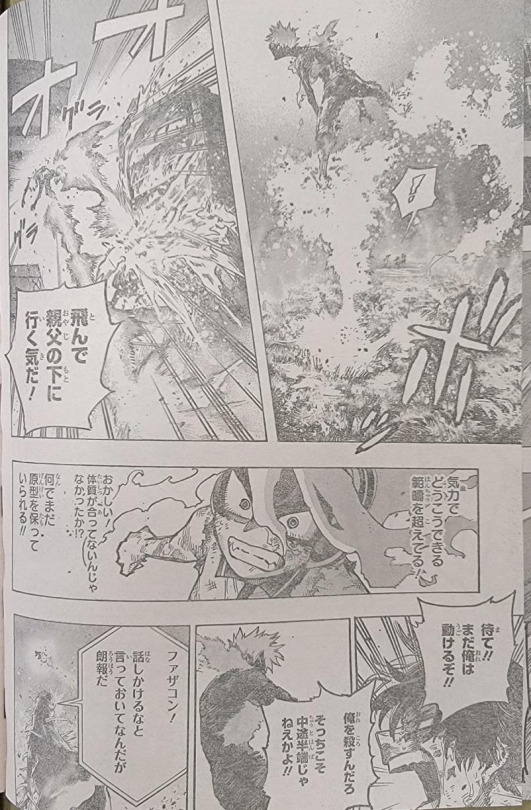
1
飛んで親父の下に行く気だ!
とんでおやじのもとにいくきだ!
tonde oyaji no moto ni iku ki da!
“I intend to fly and go to where my old man is!”
2
気力でどうこうできる範疇を超えてる!
(?)でどうこうできるはんちゅうをこえてる!
(?) (kanji: kiryoku) de dou kou dekiru hanchuu wo koeteru!
That’s beyond the scope of what he can do with willpower!
(Note: The furigana reading of the kanji for “willpower” is illegible.)
3
おかしい!体質が合ってないんじゃなんかったか⁉︎
おかしい!たいしつがあってないんじゃなんかったか⁉︎
okashii! taishitsu ga attenainja nankatta ka!?
How strange! Wasn’t it that he doesn’t have the constitution [for that]!?
4
何でまだ原型を保っていられる‼︎
なんでまだげんけいをたもっていられる‼︎
nande mada genkei wo tamotte irareru!!
Why is he still able to endure that prototype!!
(Note: I think she means: “Why can he endure that move (Phosphor) he only just learned?”)
5
待て‼︎まだ俺は動けるぞ‼︎
まて‼︎まだおれはうごけるぞ‼︎
mate!! mada ore wa ugokeru zo!!
“Wait!! I can still move!!”
6
俺を殺すんだろ
おれをころすんだろ
ore wo korosundaro
“Aren’t you gonna kill me?”
7
そっちこそ中途半端じゃねえかよ‼︎
そっちこそちゅうとはんぱじゃねえかよ‼︎
socchi koso chuuto hanpa ja nee ka yo!!
“Aren’t you also being half-hearted!!”
8
ファザコン!
FAZAKON!
“Father Complex!”
9
話しかけるなと言っておいてなんだが朗報だ
はなしかけるなといっておいてなんだがろうほうだ
hanashi kakeruna to itte oite nan da ga rouhou da
“I told you not to talk to me, but there’s good news.”
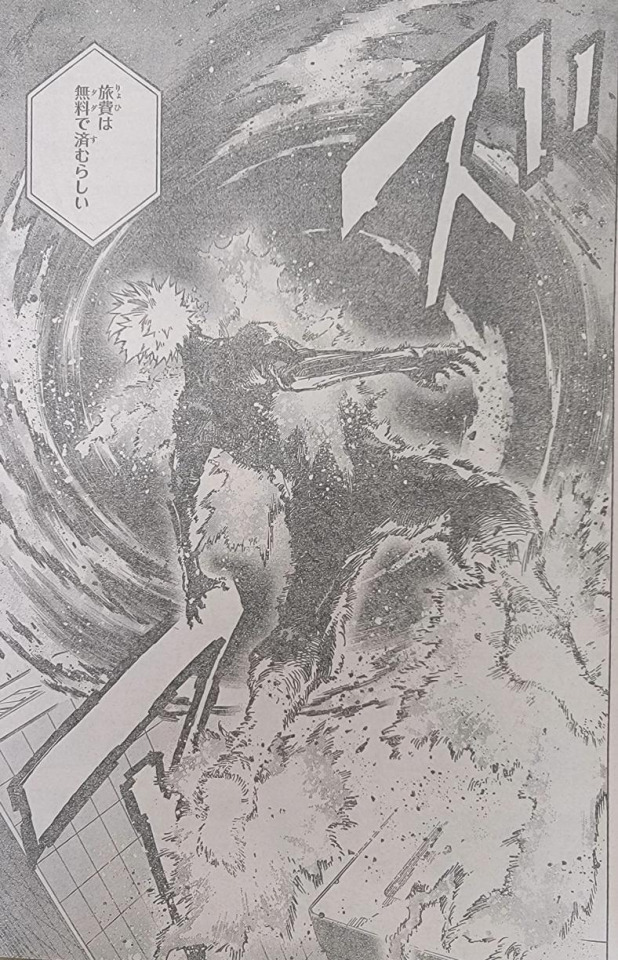
1
旅費は無料で済むらしい
りょひはタダですむらしい
ryohi wa TADA (kanji: muryou) de sumu rashii
“It seems the travel expenses are completed for free.”
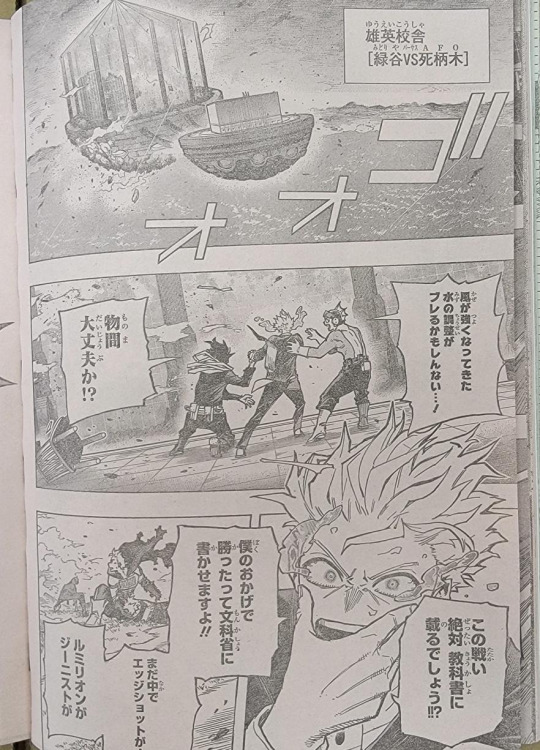
1
雄英校舎「緑谷VS死柄木」
ゆうえいこうしゃ「みどりやバーサスAFO」
yuuei kousha 「Midoriya BAASASU AFO (kanji: Shigaraki)」
The UA building, Midoriya VS All For One (read as: Shigaraki)
2
風が強くなってきた水の調整がブレるかもしんない…!
かぜがつよくなってきたみずのちょうせいがブレるかもしんない…!
kaze ga tsuyoku natte kita mizu no chousei ga BUREru kamoshinnai...!
“The wind is getting stronger, so the water adjustment may be shaky...!”
3
物間大丈夫か⁉︎
ものまだいじょうぶか⁉︎
Monoma daijoubu ka!?
“Monoma, you okay!?”
4
この戦い絶対 教科書に載るでしょう!!?
このたたかいぜったい きょうかしょにのるでしょう!!?
kono tatakai zettai kyoukasho ni noru deshou!!?
“This battle will definitely be put in the textbooks, right!!?”
5
僕のおかげで勝ったって文科省に書かせますよ‼︎
ぼくのおかげでかったってもんかしょうにかかせますよ‼︎
boku no okage de katta tte monkashou ni kakasemasu yo!!
“I will make the Ministry of Education write that we won thanks to me!!”
6
まだ中でエッジショットが
まだなかでエッジショットが
mada naka de EJJISHOTTO ga
“Edgeshot, who is still inside”
7
ルミリオンがジーニストが
RUMIRION ga JIINISUTO ga
“and Lemillion and Jeanist”
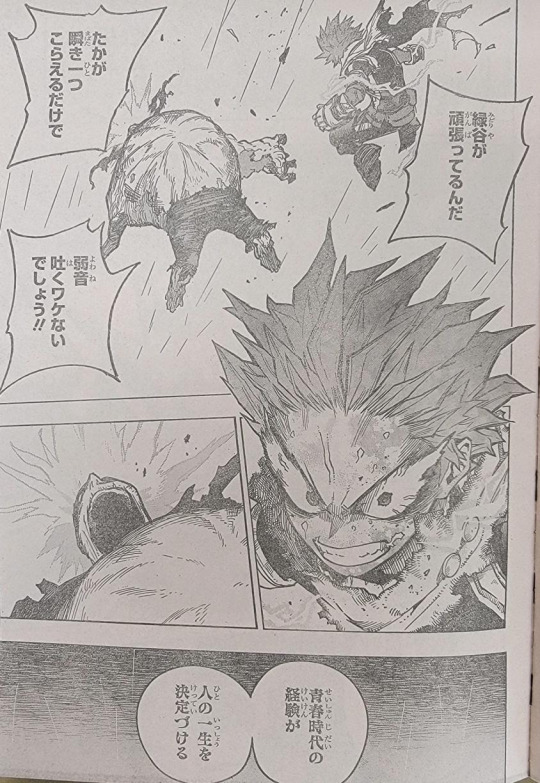
1
緑谷が頑張ってるんだ
みどりやががんばってるんだ
Midoriya ga ganbatterunda
“and Midoriya are all trying their best.”
2
たかが瞬き一つこらえるだけで
たかがまばたきひとつこらえるだけで
taka ga mabataki hitotsu koraeru dake de
“To just hold back one blink of the eye”
3
弱音吐くワケないでしょう‼︎
よわねはくワケないでしょう‼︎
yowane haku WAKE nai deshou!!
“is no reason to whine!!”
4
青春時代の経験が
せいしゅんじだいのけいけんが
seishun jidai no keiken ga
“Experiences from adolescence”
5
人の一生を決定づける
ひとのいっしょうをけっていづける
hito no isshou wo ketteidzukeru
“determine a person’s whole life.”
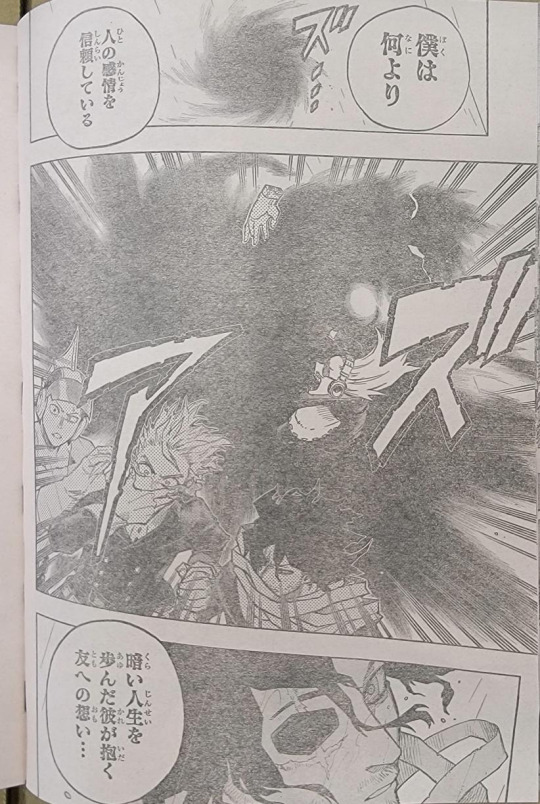
1
僕は何より
ぼくはなにより
boku wa nani yori
“I, more than anything,”
2
人の感情を信頼している
ひとのかんじょうをしんらいしている
hito no kanjou wo shinrai shite iru
“trust in people’s emotions.”
3
暗い人生を歩んだ彼が抱く友への想い…
くらいじんせいをあゆんだかれがいだくともへのおもい…
kurai jinsei wo ayunda kare ga idaku tomo e no omoi...
“Feelings for a friend harbored by one* who walked a dark life...”
(*Note: I used “one” to make it sound good in English, but in Japanese the word used here is the pronoun “he.”)
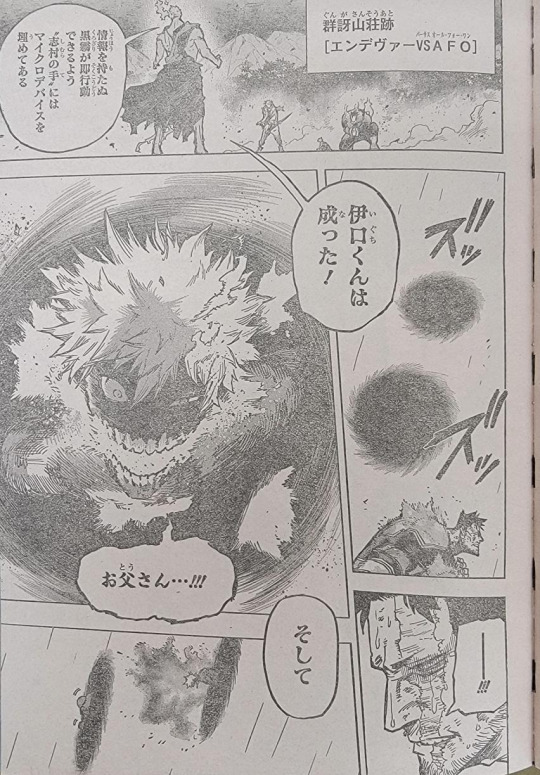
1
群訝山荘跡 (エンデヴァーVS AFO)
ぐんがさんそうあと (エンデヴァーバーサスオール・フォー・ワン)
gunga sansou ato (ENDEVAA BASAASU OORU FOO WAN)
Gunga Mountain Villa Ruins (Endeavor VS All For One)
2
情報を持たぬ黒霧が即行動できるよう"志村の手"にはマイクロデバイスを埋めてある
じょうほうをもたぬくろぎりがそくこうどうできるよう"しむらのて"にはマイクロデバイスをうめてある
jouhou wo motanu Kurogiri ga soku koudou dekiru you “Shimura no te” ni wa MAIKURO DEBAISU wo umete aru
“So that Kurogiri, who has no information, could immediately act, I embedded a micro-device in Shimura’s hand.”
3
伊口くんは成った!
いぐちくんはなった!
Iguchi-kun wa natta!
“Iguchi-kun has succeeded!”
4
お父さん…!!!
おとうさん…!!!
otousan...!!!
“Father...!!!”
5
そして
soshite
“And”

1
ホォォオオオオオクス…!
HOOOOOOOOKUSU...!
“Haaaaaaaawks...!”

1
哀れな男の死は
あわれなおとこのしは
aware na otoko no shi wa
“The death of a pitiful man”
2
一人の少女の胸に"敵意"を生んだ
ひとりのしょうじょのむねに"てきい"をうんだ
hitori no shoujo no mune ni “tekii” wo unda
“gave birth to animosity in the heart of one young woman.”
3
全てを巻き込み怨恨を晴らしたい男は
すべてをまきこみえんこんをはらしたいおとこは
subete wo makikomi enkon wo harashitai otoko wa
“A man who wants to swallow up everything and dispel [his] resentment”
4
そして少女に傾国の一手を与えた
そしてしょうじょにけいこくのいってをあたえた
soshite shoujo ni keikoku no itte wo ataeta
“and then gave to the young woman the one method to destroy a country.”
5
さァ見ようじゃないか鷹見くん
さァみようじゃないかたかみくん
saA miyou ja nai ka Takami-kun
“So now, shall we see, Takami kun?”
6
君があの時彼を最��先に処分していなければどうなっていたのか
きみがあのときかれをさいゆうせんにしょぶんしていなければどうなっていたのか
kimi ga ano toki kare wo saiyuusen ni shobun shite inakereba dou natte ita no ka
“If you hadn’t disposed of him as your top priority back then, what would have happened?”
tagline
邂逅、再びー
かいこう、ふたたびー
kaikou, futatabi--
Chance encounter, once again--
7
ーーーそいつを殺せ‼︎今すぐ‼︎
ーーーそいつをころせ‼︎いますぐ‼︎
---soitsu wo korose!! ima sugu!!
“---Kill that guy!! Right now!!”
#my hero academia leak translations#mha 374#bnha 374#my hero academia manga spoilers#final showdown spoilers#yes yes shit hits the fan and all#but honestly#i think fandom has been snoozing on the ominous weather#that's clearly the big shit incoming#definitely getting some heroes rising vibes about it too
232 notes
·
View notes
Text
Jinyiwei (Investigator Archetype)
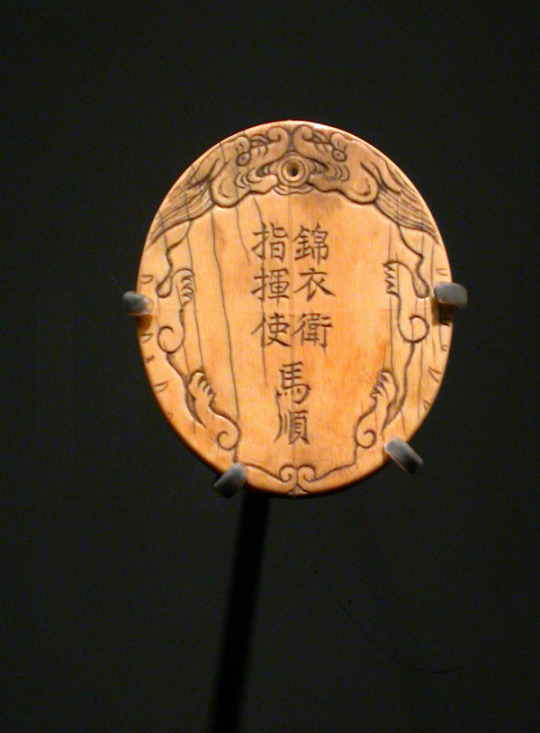
In the real world, the Jinyiwei, or “Embroidered Uniform Guard” was a secret police organization founded in the 14th century by the Hongwu Emperor in order to root out corruption and insurrection from within, able to overturn and ignore the judicial proceedings to arrest, interrogate, and punish anyone in the kingdom, including nobility and even the emperor’s own relatives.
Ostensibly this body would help preserve the empire with only the Emperor themselves to answer to, able to arrest and prosecute politically untouchable figures should they become enemies of the state.
Buuuuut if you’ve ever heard the term “secret police” in regards to world history before, you probably know how this goes. At best, the Jinyiwei were used as assassins to eliminate rivals, and at worse, were just as corrupt and capable of abusing their own power.
Who knew a paramilitary group answerable to literally only one man would be a bad idea for everyone?
However, for all it’s real faults, the Jinyiwei we’re describing today is a bit different than the real thing. For one, the Mandate of Heaven is actually real with gods and divine dragons granting power and authority to rule empires.
However, corruption remains, and the Jinyiwei of the Lung Wa empire was created to counteract and root out this corruption that drove the bureaucracy of the nation into the dirt, but in the end they failed, falling to corruption itself until the empire fractured and crumbled, robbing them of any authority.
But why the original Lung Wa Jinyiwei are long gone, there are those across Tian Xia that take inspiration from them, and seek to emulate them as they stand against the corruption that poisons governments and ruins nations.
Such dedication grants these investigators a bit of divine power, which they use alongside their keen minds to bring justice to the land, even if they aren’t quite as unimpeachable as their ancient predecessors.
The result is a sort of fusion of investigator and inquisitor, as we’ll soon see.
Careful consideration and insight, as well as the blessing of the divine is what fuels these investigators. As such, their inspiration is powered by their wisdom rather than intelligence, and instead of using alchemy they cast spells, drawing magic from the same arsenal as inquisitors.
Like the Jinyiwei of old, they understand that corruption and deception can be anywhere, and are especially skilled at noticing lies, forgeries, and disguises, as well as that which is hidden, be it a person or secret containers and doors.
Their suspicion also guards them against the magics of deception, enchantments and illusions, helping them avoid falling under their sway and pierce the false reality they create.
Finally, their divine mandate goes so far as to allow them to unleash divine judgement as inquisitors do, albeit somewhat less skillfully.
With the combination of the inquisitor spell list, geared towards information gathering, buffing, debuffing, and divine wrath; as well as their knack for discovering all types of deception, this archetype plays a bit more of a support and combat role than the vanilla inquisitor before even taking talents into account. As such, A combat build seems like a good choice here, one that can learn about the enemy and set up spells and tactics beforehand to take them down.
As written, the lore states that these individuals are not part of an organization, extrajudicial or otherwise. As such, their desire to follow such a path and endorse such ideals may be considered a relic of the past, and what that means will vary by nation and by individuals. Some may mock them as deluded fools clinging to ideals and a nation that no longer exists, others may honor them as a symbol of better days, or revile them as echoes of a past that needed to burn or as the shadow of a threat to the new order. Or, you know, in your setting their organization may still exist, and may or may not a blight upon the people in the way that secret police tend to be.
Through terrible coincidence and just bad luck, the party has accidentally slain one of the sacred white-antlered deer that only the emperor may hunt, and now they are on the run, chased by the mask-wearing secret order that answers only to His Holy Eminence.
A chance encounter can change your life, and so it was with Jinga, a monkey goblin who stumbled upon an aging old hermit on his island home who taught him about the great empire and how he was once one of it’s secret guardians, blessed by the gods. Jinga looked up to him so much that he studied his ways and received the divine blessing, leaving home to offer his services. He never fully understood, however, that the empire had fallen long ago.
The nation is on the verge of falling, consumed from within, all at the hands of those who should have been it’s protectors. Indeed, the Talisman Police, named for the divine tokens of their role they wear, have been corrupted from within and seek to usurp control. Is their leader a fiend in disguise? Merely power-hungry? It matters not. All that matters is that they must be stopped.
11 notes
·
View notes
Text
Today I want to rant at length about highlight a plot-relevant but otherwise rather dry line from Shido's Palace, simply because it's been living rent-free in my head for days and I'll die if I don't.
And up front I want to say: this is not intended as translator bashing, shit like this is rarely on the translator, though I will possibly get a little aerated at times. More about that at the end.
This is really long, and probably very boring. So to summarise quickly:
Ooe's "diplomat" and "president of some company" are the Minister for Transport and the railway company president from the 4/10 cinematic with Sae and the SIU director;
Shido wasn't "specially appointed", he's the Minister of State for Special Missions, likely with oversight for either the PTs or the psychotic breakdowns;
being a pro translator sucks;
something about a well.
my least favourite line so far
Shadow Politician
春先に地下鉄事故があっただろう?狙ったのは、あの運転士だからな。
harusaki ni chikatetsu jiko ga atta darou? neratta no wa, ano untenshu da kara na
Do you recall the subway accident early last spring? The one I had targeted was that engineer.
nb—this "engineer" is the train driver. I didn't get this at all, but apparently train drivers are called engineers in the US? This is a good example of how something you think is a mistranslation may not be.
There is an occasion where the guy is referred to as a "driver", but this is actually 車掌 shashou—in Japanese, a conductor in the British sense, the member of staff who is not the driver, but walks up and down checking tickets. This is meant to hint to us, I suspect, that the NPC saying this may not be a reliable source—he's making some spooky claims, after all. Yet again, in America, the conductor can be the driver of the train...? IDK, confusion abounds.
But on to the important bit:
Shadow Politician
目障りな国交大臣と、現政権派の社長のクビを取るためだった。mezawarina kokkou daijin to, genseiken-ha no shachou no kubi o toru tame datta
It was to take out the president of some company and a diplomat who sided with current government.
Full disclosure: I have never liked this line. It screamed of being mistranslated. "The president of some company"? Ooe had this guy destroyed, and he can't be specific? And "a diplomat"? This has come from nowhere—I can't think of another diplomat in P5. It just all seems so random. And it is random. Because this was meant to close up a background plot element from the start of the game, and it just... doesn't any more.
So, for this one, I'm just going to break out the big red DENIED stamp again:

The hell of it all is that I can see what they did here, so I'm going to go through it at excessive length, as like... an object lesson in what not to do. Not just for you, but for me.
And I need to be clear up front that I'm not an authoritative source on the Japanese language. I'm not fluent, my Japanese is barely passable (which is why asks, comments and discussion on my language posts are all always super welcome, btw, just like for everything else I post). I'm just a weeb on the Internet, who constantly posts assertions and theories that future me will hate. Bring your salt shaker.

Quick glimpse behind the curtain: this is from my Google doc for Shido's Palace. You have the textbox code, the speaker, then the text in Japanese, romaji and the localisation. Usually these days I don't add the romaji (it's not good for your reading), but lines that go into posts get it temporarily.
Words I don't know, or had to verify (like shachou, where I wanted to know if it was always a company president or if it could be a role within a political faction), or lore/grammar notes, all get comments, which are highlighted in yellow.
the peril of dictionaries
I'm bilingual English/Welsh-speaking; until I was fifteen, I was educated through the medium of Welsh. So I got taught very early on about the correct use of dictionaries. The exact example I remember is that a past pupil (probably apocryphal) wanted to put "Well, Dad was angry!" into Welsh. And they had looked up "well"....
ffynnon, roedd Dad yn grac!
Well, Dad was angry!
This is a ffynnon:
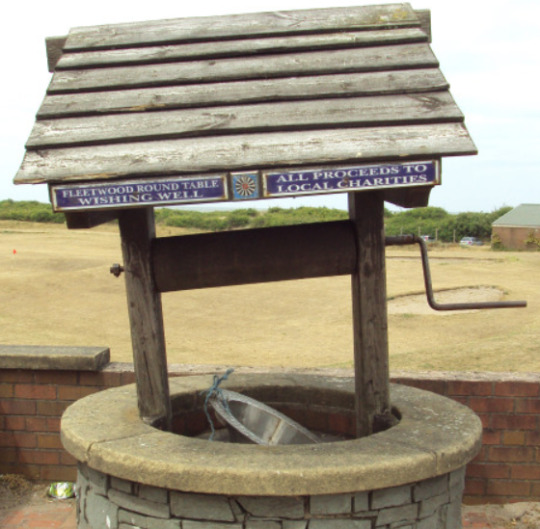
It's a funny story. The point is that you should always flip to the other half of the dictionary to verify the meaning you found. Or these days, with the Internet and all, we get to check multiple dictionaries, corpuses and sources! And a riotously good time it is.
part one: who was that mysterious diplomat
The main phrase I want to focus on is 国交大臣 kokkou daijin. This is what has been rendered "a diplomat" in the localisation. On first glance, that's a string of kanji I don't know: country, the right-hand side of the second half of 学校 gakkou (school), something about a big man... is that read daijin?...
Maybe it's a yojijukugo—a fixed four-kanji phrase with an often-idiomatic meaning? Let's put the whole thing into Jisho and see what we get.
(Incidentally, I bash Jisho constantly, but it's still my first stop because it's fast and often good enough. You just shouldn't rely on it for anything critical; trust, but verify.)
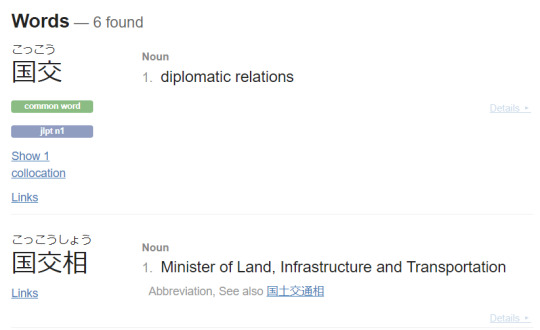
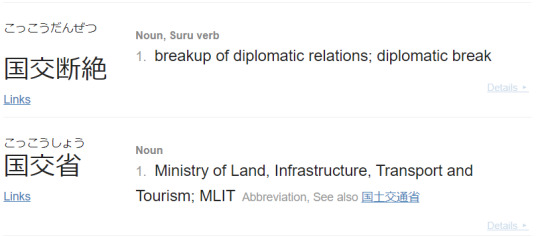
B|
Well, there's no yojijukugo. But one glance at that tells us that Ooe's "diplomat" is not a diplomat at all. Ooe's "diplomat" is the Minister for Transport who was brought down as a result of this subway crash in April. You might have thought Shido had this guy taken out, but no. He did it for Ooe. He crashed a subway train, injuring 80 people, as nothing but a favour to Ooe.
But why is it using kokkou, "diplomatic relations"? Well, Jisho gives us a convenient "see also" link. Let's take a look:

You see what they did there? The full phrase is 国土交通相 kokudo koutsuu-shou, "Minister for (National) Land and Transport". But nobody wants to say that. So you strike out some of the kanji. The word becomes kokkoushou—but everyone still knows who you mean.
Let's do a bit of that verification I mentioned. Here's Wikipedia:

HmmMM. Notice how the Minister and the Ministry are read the same; only the last kanji changes. But we're still on track.
Let's click over to Japanese Wikipedia. What do they have to say?

And there it is again, highlighted: our old friend 国交 kokkou, "diplomatic relations". "In Japanese, this is commonly abbreviated as kokkoushou".
daijin
How about 大臣 daijin? It looks like it just means "big man" or "important man", but what does it actually mean? Again, let's start with Jisho:
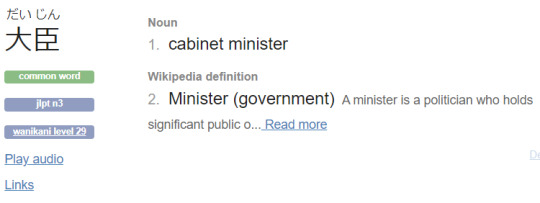
... B|
Jisho offers us a bunch of "further reference" links, so I'm going to go straight to Japanese Wikipedia for this one—which sends you to an old revision of the page, by the way; be sure to go to the latest one:
大臣(だいじん)は、本来は皇帝や国王などを輔弼して国政を司る重要官職だが、今日では一般的に君主制か共和制かにかかわらず、政府を構成し、各行政部門の長に位置する官職を指す。閣僚ともいう。
Historically, 大臣 daijin referred to the high position of those responsible for matters of state, who advised emperors and kings on those matters. However, today it generally refers, regardless of whether the government in question is a monarchy or republic, to an official who leads a division of government.
... ... B|
In other words, a cabinet minister. Seems to sum it up pretty well, but let's just look at the invaluable ALC corpus on this:
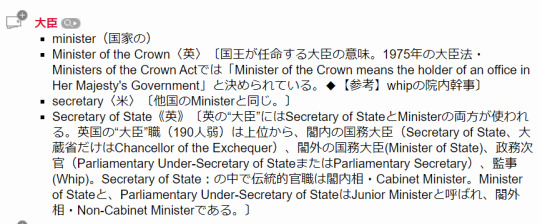
So we have it. A daijin is unquestionably a cabinet minister. And Ooe is unquestionably talking about the Minister for Transport.
last-minute edit: I actually wrote this entire post, preened for completing it, then closed it in my drafts and forgot all about it. Until I opened my grammar text to a random page and found this:

EVEN MY GRAMMAR BOOK KNOWS.
Actual grammar books are a bit obsolete in 2023, but that is a great one if you're in the market. Just don't get the Kindle edition, it's illegible on Kindle which is probably not what you want.
Incidentally, yes, a Diet member is sensei—you can often hear people refer to Shido that way.
but we can also backreference this one
Another cool thing we can do is get context-relevant examples. That is, we can search the P5 script itself to see how it uses daijin and kokkou daijin.
Two lines use kokkou daijin. One is this line of Ooe's. The other is a news story, which gets it right:
Newscaster
国交大臣の辞任に伴い、与党への批判が高まっており⋯
kokkou daijin no jinin ni tomanai, yotou e no hihan ga takamatte ori...
Criticism of the ruling party has surged, following the resignation of the Minister of Transport.
But people talk about the Minister quite a bit. What phrases do they use? Well, sometimes he's simply the daijin—"the Minister"; this usually becomes "Minister of Transport" for context. Sometimes he's the kokkoushou, as we discussed above. And often, on the news, he gets his full title—he's the kokudo koutsuu daijin.
Usually, daijin by itself in P5 is part of 総理大臣 souri daijin—the prime minister.
meanwhile in shidoland
In passing, the MoT is not the only one who gets translated out of the script. You might remember from the calling card cinematic that Shido is the "Minister of State for Special Missions".
Makoto tries to tell us this at one point:
Makoto
特命担当大臣現職の閣僚よ
tokumei tantou daijin genshoku no kanryou yo
He was specially appointed to the position. That's his current title.
He's the current Minister of State for Special Missions.
(What is that, exactly? I'm not gonna do a huge research effort on this one right now, this post is already longer than the Nile and dry as sand, but they appear to be appointed to deal with things that are a big deal—the link gives you examples of some of the issues they've been appointed for. It's not inconceivable that Shido was appointed to the Cabinet to deal with the national crisis of psychotic breakdowns and mental shutdowns that he started. Either that, or the PTs themselves—he does talk about them an awful lot.)
and that's not all
There is, of course, a real Japanese Minister for Transport. We can put kokkou daijin into Google (with a little は on the end to filter Chinese-language sites), and what do we get back? The first hit is the Wikipedia page for the Minister for Transport.
My guess would be that the translator knew the word kokkou, but they didn't have an encyclopaedic knowledge of Japanese politics. So they read kokkou daijin as some kind of important diplomat.
part two: in which we invent time travel
And that was only the first of the two things that made me hate my life about that textbox. Let's bring the line back:
Shadow Politician
目障りな国交大臣と、現政権派の社長のクビを取るためだった。mezawarina kokkou daijin to, genseiken-ha no shachou no kubi o toru tame datta
It was to take out the president of some company and a diplomat who sided with current government.
The second thing that got under my skin was this:
現政権派の社長
genseiken-ha no shachou
This means, in the terms of the localisation, "a company president who sided with current government". But... what is even going on here?
In Japanese, modifiers go before the things they modify, right? Like ... always. I'm going to cite the slightly-tongue-in-cheek but also inestimable Jay Rubin (probably best known as Haruki Murakami's English translator) on this:
... by about the middle of the seventh century, the Emperor, who still wielded actual power then, made a rule, maybe the one rule that really works in the language and never gets broken: “From this day forward, subjects will always come before their verbs. And, just to keep things neat, modifiers will always come before what they modify.” Never in all these centuries have there been any exceptions—at least not in normal syntax....
Shōmetsu shita zō is “The elephant that vanished”—a fragment, just a noun with a modifier in front of it. By putting it before the zō, we’ve changed the shōmetsu shita into a modifier. I’m going to go way out on a limb here and call anything that modifies a noun an adjective. Shōmetsu shita zō (literally, “vanished elephant”) works exactly the same way as utsukushii zō (“beautiful elephant”).
(That's from the book "Making Sense of Japanese", by the way, which y'all should totally read if you can find a copy. It's one of Kodansha's little books, which are all worth at least a glance; they published tons of them, with titles like "All About Particles" and "How To Sound Intelligent In Japanese" and etc etc etc.)
back to our sentence
So how is this translation breaking that rule? Let's look at it again, with the problematic parts bolded:
目障りな国交大臣と、現政権派の社長のクビを取るためだった。mezawarina kokkou daijin to, genseiken-ha no shachou no kubi o toru tame datta
It was to take out the president of some company and a diplomat who sided with current government.
現政権派 genseiken-ha is the current government; the current administration. No problems there. It's just in the wrong place.
kokkou daijin, we established, is the localisation's "diplomat". genseiken-ha no translates as "aligned with the current government". But genseiken-ha is after kokkou daijin. It cannot be modifying it. It can't have been taken for a relative clause—what Jay Rubin framed as an adjective in the quote up there—because we still have the two people the sentence describes, the "diplomat" and the businessman; the sentence has not been read as talking about a diplomat who is also a government-boosting company president.
We should have, literally, "an eyesore of a minister for transport" and "a company president who sides with current government". But we just... don't.
Is it possible it doesn't make sense that a company president would be aligned with the government? Has the sentence been rearranged for that reason? But this is essentially what Okumura does: he's a company boss aligned with a powerful politician. So are the TV and IT Execs whose shadows we meet, for that matter. They are not in politics themselves, but they network with politicians. Big business and politics are always hand-in-hand.
All of this gives us the following working version of the translation:
It was to take down that intolerable Minister of Transport and a company president who supported the government.
And on that note....
who is that mysterious company president
"the president of some company", the localisation says. This seems a bit vagued up. Are there any company presidents we should be aware of here?
The answer is yes:
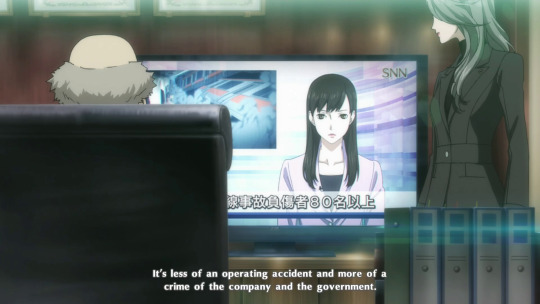
On 4/10, in the cinematic after the crash, the SIU Director talks at length about how this is the fault of "the company and the government". Of course he does—he knows very well what's happened, and he knows where the blame is to be assigned:
SIU Director: It's less of an operating accident and more of a crime of the company and the government.
SIU Director: Site inspectors apparently reported all of this six months ago—the deterioration of the tracks and the ATC.
And the last two lines in full, since they diverge:
SIU Director
それを会社が隠ぺい…国交省も故意に見逃したフツがある。
sore o kaisha ga inpei... kokkoushou mo koi ni minogashita futsu ga aru
Seems the railway company and the Ministry of Transport both turned a blind eye to the truth.
So the railway company covered it up... and the Ministry of Transport did what they do best: they turned a blind eye to it..
This is just a slight difference in emphasis: the railway company allegedly performed a deliberate coverup, and it was the Ministry that did their normal thing, and chose to overlook that coverup....
But note that "railway company" here is just 会社 kaisha, "company". Originally, it was obvious from context; the localisation clarifies it. But when Ooe later mentions a 社交 shachou, a "company president", in the same obvious-from-context way, it has not been picked up on—our very personal railway company president has become "the president of some company". Who was important enough for Ooe to personally destroy, but not important enough for him to remember where he worked.
SIU Director
隠し通せんよ。大臣の進退まで行くだろう。
kakushitoosen yo. daijin no shintai made iku darou
There's no way they can hide. This will go all the way to the top.
They can't keep this hushed up forever. By the end of this, the transport minister's job will be on the line.
... but here's the first real appearance of the Minister for Transport, with the SIU Director—who, again let's not forget, knows this crash was engineered in part to get that minister—not just saying this incident will "go all the way to the top", but that it will specifically end with them coming for the minister's job.
where did we come from, where did we go
Where does that leave us with the sentence?
It was to take out the president of some company and a diplomat who sided with current government.
It was to take down that intolerable Minister of Transport, and the president of the railway company. He supported the government, after all.
We've broken that little genseiken-ha out into its own little explaining sentence, since it's hard to phrase as one sentence in natural English. And now you know.
btw, leave the translators alone
Look, this is far from the best translation I've ever seen. We should be mad about this, right? Well... no.
As a hobbyist, I have the luxury of focusing on a single fandom, spending hours, days, or weeks thinking about single scenes, researching context, language and concepts, confirming I've understood things to the best of my ability. Your average animanga/JRPG translator is not being paid well enough, or given nearly enough time, to do this. They cannot be expected to do this.
This is not, not, NOT on the translator. Read that ten times. We are supposed to go from our second language to our native tongue; that's how translation works best. So there will always be areas of confusion like this, things that need clarification and research. Japanese media translation requires a vast knowledge of differently arcane terms depending on the work; nobody will know them all.
Who is this on? It's on Atlus, for skimping on and rushing not only the translation but the editing; they did the English localisation of a massive property on the cheap. Something like this should have been caught by the editor, but honestly P5's editing (including the way things are finalised in English, and the overall polishing of the script) tends to come in for more criticism than the translation per se.
tl;dr: blame the company, not the poor translator who was most likely just one of us trying to make a shitty living with something they love, and a skill they worked their ass off for.
#persona 5#p5 meta#japanese language#translation#long post#very long#very boring#you have been warned
56 notes
·
View notes
Text
*presents this little Clarkson ficlet to you in a heart-shaped box
Wayne walks back to the trailer at a snail’s pace as he flicks through the pile of mail he’d just collected. His boots scuff along the loose gravel as he walks carefully so as not to stumble. He’d toed them on in haste, not bothering to zip them up because he needed to get to the mailbox at the front of the Forest Hills driveway before his nephew. They hadn’t received a letter from his no-good incarcerated brother since before Christmas, so he was expecting another. And it could come at any time and he wanted to spare Eddie the anguish of the grovelling and self-involved drivel his brother always spewed.
Sure enough, as he flips past another bill (the secret government only paid for new trailers for each resident and didn’t bother about the increased utility costs), there’s a letter stamped with a faded Indiana State logo. He tucks it in his flannel breast pocket and stops short of the steps of his home at the sight of the next letter.
He recognises the writing immediately.
As a hot rush creeps into his chest (panic, hope, whatever - he doesn’t know), Wayne stuffs the envelope into his back jeans pocket and checks his watch. He’s got a good hour before he has to be at the mechanic for a quick morning shift.
He makes himself a coffee (and Eddie a cocoa while he’s at it) and goes to sit on the old floral recliner Claudia Henderson had given him last year when everyone was regrouping after ‘the earthquake’. Wayne smiles as he opens the envelope, trying not to think too much about Scott Clarke’s name on the return address. He opens the letter and skims to Scott’s sign-off that includes a little heart. His heart skips a beat.
Shit. It’s Valentine’s Day.
Just then Steve Harrington pulls up in his marron Beemer and steps out wearing a pale pink shirt and holding a single rose. And then Wayne can’t stop thinking about how his nephew has probably forgotten the day too.
The Munsons weren’t exactly known for romantic gestures.
“Hi Wayne,” Steve says meekly as he steps onto the small porch.
“You boys have plans today?” he asks, nodding at the rose.
“Yes,” Steve says, shielding the flower a little.
He huffs a small laugh and gestures to the door. “Eddie’s up.”
The boy beams and heads inside.
Wayne abandons the letter as he stares out at the trailer park and watches his neighbours putter about, getting in the cars for work, and walking up to the mailbox. He sighs with relief when he sees Susan Mayfield smiling and chatting away with her daughter as they get into their car.
It is a warm day, considering it’s February.
The front door bursts open and Eddie steps out, skipping down the steps.
“Adios, Wayne!” he calls over his shoulder.
“Did you remember to give Steve a card today, boy?” he calls, frowning.
“Yes,” his nephew chimes, holding an envelope up sky high. “You want me to read my super-dirty Valentine’s message to my beloved Prince?”
“Dude! Shut up!” Steve shrieks from the front door.
“No thank you,” Wayne laughs as Steve rushes out past him.
“Bye, Wayne!” he hurries, scurrying away and shaking his head as Eddie laughs with that cheeky grin that gets him into far too much trouble for his own good.
“What?” Eddie says as Steve hops in the car. “I just want you to know how horny you make me, Stevie.”
Wayne shakes his head and makes fleeting eye contact with Steve who just fires up the car in haste, looking mortified. His nephew sure had a bad habit of making him hear things he wish he didn't. And making everyone, even his boyfriend, very uncomfortable.
Even though he teases with that grin, Wayne thinks his nephew is brave. It makes him worry sometimes. Okay, it makes him worry a lot. And he worries about Steve too, in this small town with everyone's narrow-minded thinking, with most of the townsfolk still thinking Eddie is a murderer.
He watches as the boys drive off, waving them goodbye and doing the same again when the Mayfeilds pass by.
Once they are all out of sight, Wayne leaves his (still full) cup of coffee and heads back inside. He checks his watch again and reaches for the phone. Scott probably won’t be at school yet.
He dials Scott’s number and as it rings, he moves to the reminder pad on the fridge and starts scribbling a note to tell Eddie he won’t be home for dinner.

#let me just dip my toe into clarkson just this once#as a treat#clarkson#scott clarke#wayne munson#steddie: valentine's day edition#(just tagging that so i can keep all my valentine's nonsense together)#clarkson ☕
92 notes
·
View notes
Text
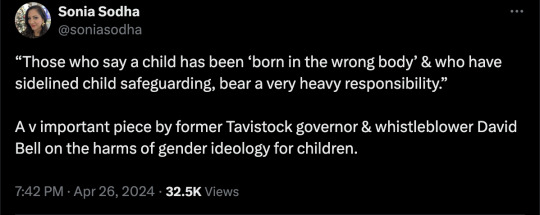
By: David Bell
Published: Apr 26, 2024
As the dust settles around Hilary Cass’s report – the most extensive and thoroughgoing evidence-based review of treatment for children experiencing gender distress ever undertaken – it is clear her findings support the grave concerns I and many others have raised. Central here was the lack of an evidential base of good quality that could back claims for the effectiveness of young people being prescribed puberty blockers or proceeding on a medical pathway to transition. I and many other clinicians were concerned about the risks of long-term damaging consequences of early medical intervention. Cass has already had to speak out against misinformation being spread about her review, and a Labour MP has admitted she “may have misled” Parliament when referring to it. The review should be defended from misrepresentation.
The policy of “affirmation” – that is, speedily agreeing with a child that they are of the wrong gender – was an inappropriate clinical stance brought about by influential activist groups and some senior gender identity development service (Gids) staff, resulting in a distortion of the clinical domain. Studies indicate that a majority of children in the absence of medical intervention will desist – that is, change their minds.
The many complex problems that affect these young people were left unaddressed once they were viewed simplistically through the prism of gender. Cass helpfully calls this “diagnostic overshadowing”. Thus children suffered thrice over: through not having all their problems properly addressed; by being put on a pathway for which there is not adequate evidence and for which there is considerable risk of harm; and lastly because children not unreasonably believed that all their problems would disappear once they transitioned. It is, I think, not possible for a child in acute states of torment to be able to think through consequences of a future medical transition. Children struggle to even imagine themselves in an adult sexual body.
Some claim that low numbers of puberty blockers were prescribed. Cass quotes figures showing around 30% of Gids patients in England discharged between April 2018 and 31 December 2022 were referred to the endocrinology service, of whom around 80% were prescribed puberty blockers; the proportion was higher for older children. But these numbers are likely to be an underestimate, as 70% of children were transferred to adult services once they were 17, and their data lost, as very regrettably they were not followed up. This is one of the most serious governance problems of Gids – also specifically addressed by the judges in Keira Bell v Tavistock. Six adult gender clinics refused to cooperate and provide data to Cass. However, having come under considerable pressure, they have now relented.
It is often claimed that puberty blockers were not experimental, as there is a long history of their use. They had been used in precocious puberty (for example where a child, sometimes because of a pituitary abnormality, develops secondary sexual characteristics before the age of eight) and in the treatment of prostate cancer. But they had not been prescribed by Gids to children experiencing gender dysphoria before 2011. The lack of long-term evidence underlies the decision of the NHS to put an end to their routine prescription for children as a treatment for gender dysphoria – that is, for those whose bodies were physically healthy.
The attempts of Gids clinicians to raise concerns about safeguarding and the medical approach were ignored or worse.The then medical director heard concerns but did not act; ditto the Speak up Guardian and the Tavistock and Portman NHS foundation trust management. I was a senior consultant psychiatrist, and it was in my role as staff representative on the trust council of governors that a large number of the Gids clinicians approached me with their grave concerns. This formed the basis of the report submitted to the board in 2018. The trust then conducted a “review” of Gids, based only on interviewing staff. The CEO stated that the review did not identify any “failings in the overall approach taken by the service in responding to the needs of the young people and families who access its support”. I was threatened with disciplinary action. When the child safeguarding lead, Sonia Appleby, raised her concerns before the trust’s review, the trust threatened her with an investigation; and its response, as an employment tribunal later confirmed, damaged her professional reputation and stood in the way of her safeguarding work.
Characterising a child as “being transgender” is harmful as it forecloses the situation and also implies that this is a unitary condition for which there is unitary “treatment”. It is much more helpful to use a description: that the child suffers from distress in relation to gender/sexuality, and this needs to be carefully explored in terms of the narrative of their lives, the presence of other difficulties such as autism, depression, histories of abuse and trauma, and confusion about sexuality. As the Cass report notes, studies suggest that a high proportion of these children are same-sex attracted, and many suffer from homophobia. Concerned gay and lesbian clinicians have said they experienced homophobia in the service, and that staff worked in a “climate of fear”.
It is misleading to suggest that I and others who have raised these concerns are hostile to transgender people – we believe they should be able to live their lives free of discrimination, and we want them to have safe, evidence-based holistic healthcare. What we have opposed is the precipitate placing of children on a potentially damaging medical pathway for which there is considerable evidence of risk of harm. We emphasised the need, before taking such steps, to spend considerable time exploring this complex and multifaceted clinical presentation. Young people and clinicians routinely refer to “top surgery” and “bottom surgery”, terms that serve to seriously underplay these major surgical procedures, ie double mastectomy, removal of pelvic organs and fashioning of constructed penis or vagina. These procedures carry very serious risks such as urinary incontinence, vaginal atrophy, cardiovascular complications and many others we are only beginning to learn about. There is a very serious risk of sexual dysfunction and sterility.
There are no reliable studies (for children or adults) that could support claims of low levels of regret. The studies often quoted (eg Bustos et al 2021) have been criticised for using inadequate and erroneous data. The critical issue here is the fact that children and young people who were put on a medical pathway were not followed up. Studies suggest that the majority of detransitioners, a growing population, who are having to deal with the consequences of having been put on a medical pathway, do not return to the clinics as they are very fearful of the consequences. The fact that there are no dedicated NHS services for detransitioners is symptomatic of the NHS’s lack of concern for this group. Many live very lonely and isolated lives.
Those who say a child has been “born in the wrong body”, and who have sidelined child safeguarding, bear a very heavy responsibility. Parents have been asked “Do you want a happy little girl or a dead little boy?” Cass notes that rates of suicidality are similar to rates among non-trans identified youth referred to child and adolescent mental health services (CAMHS). Indeed, the NHS lead for suicide prevention, Prof Sir Louis Appleby, has said “invoking suicide in this debate is mistaken and potentially harmful”.
It has been suggested that the Cass report sought to “appease” various interests, with the implication that those who have promoted these potentially damaging treatments have been sidelined. But in reality, it is those of us who have raised these concerns who have been silenced by trans rights activists who have had considerable success in closing down debate, including preventing conferences going ahead. Doctors and scientists have said that they have been deterred from conducting studies in this area by a climate of fear, and faced great personal costs for speaking out, ranging from harassment to professional risks and even, as Cass has experienced, safety concerns in public.
The pendulum is already swinging towards a reassertion of rationality. Cass’s achievement is to give that pendulum a hugely increased momentum. In years to come we will look back at the damage done to children with incredulity and horror.
David Bell is a retired psychiatrist and former president of the British Psychoanalytic Society
==
David Bell was one of the original Tavistock whistleblowers.
No one is "born in the wrong body." You and your body are one and the same.
#David Bell#Cass report#Cass review#Dr. Hilary Cass#Hilary cAss#gender affirming healthcare#gender affirmation#gender affirming care#medical scandal#medical malpractice#medical corruption#gay conversion therapy#gay conversion#conversion therapy#puberty blockers#born in the wrong body#religion is a mental illness
6 notes
·
View notes